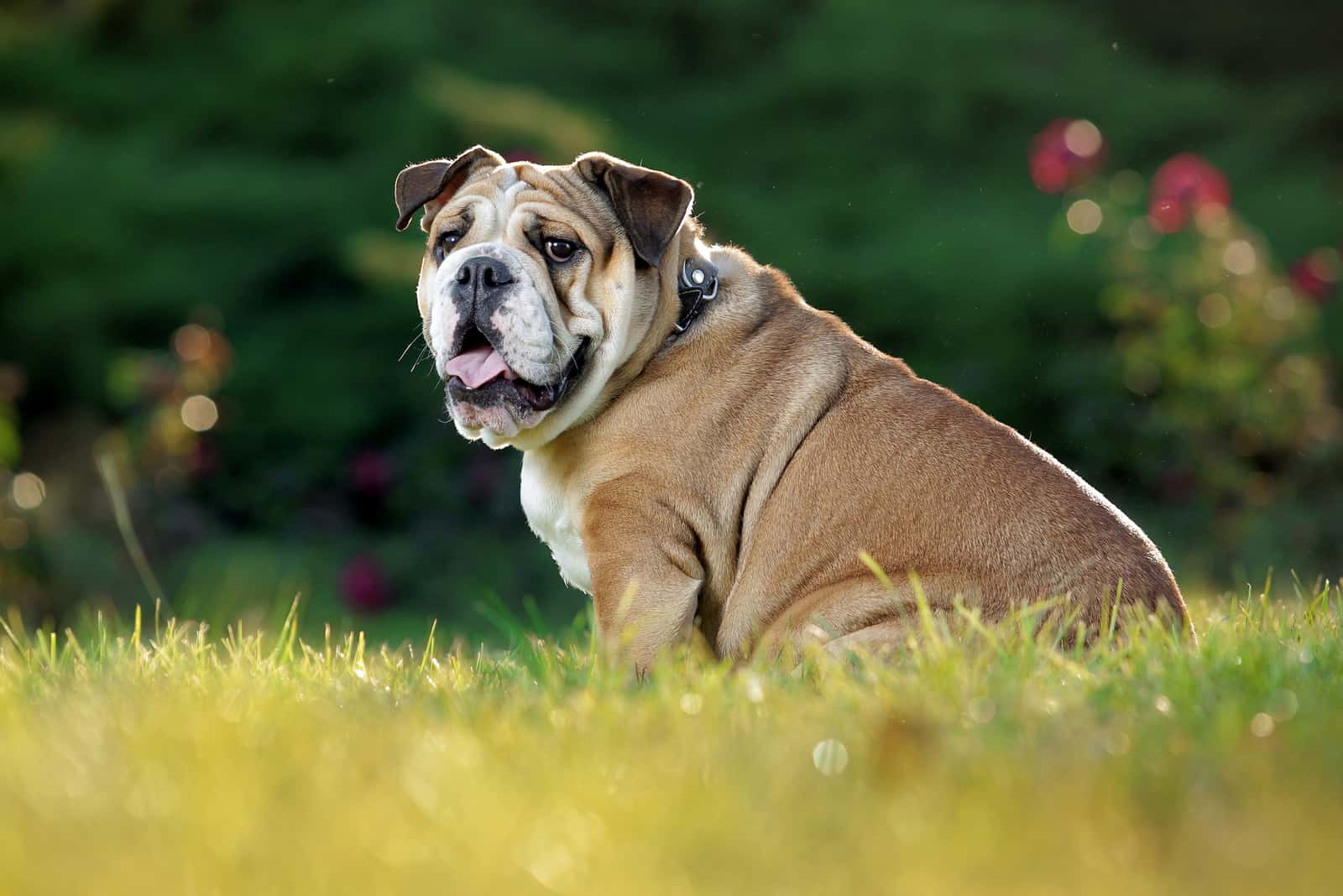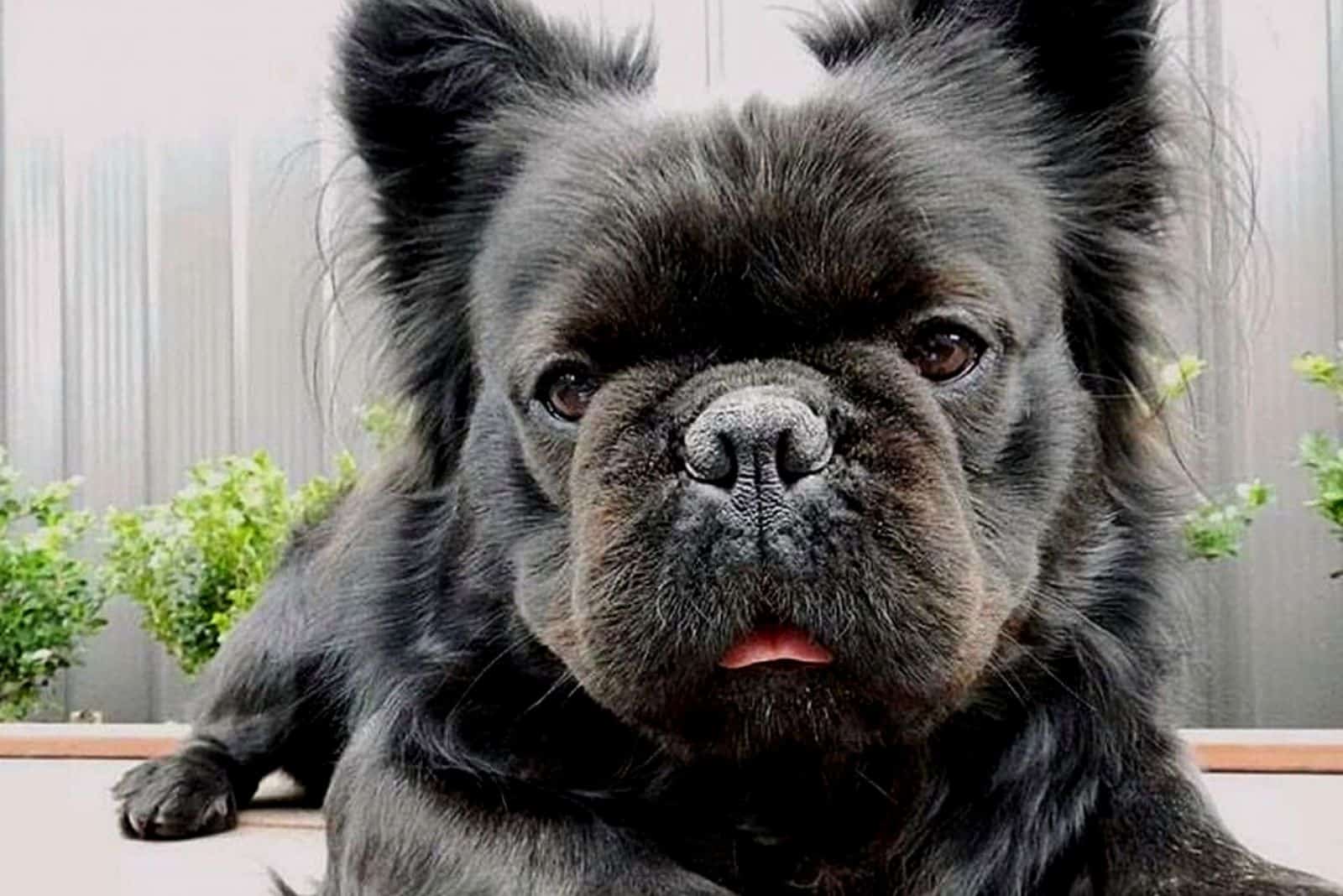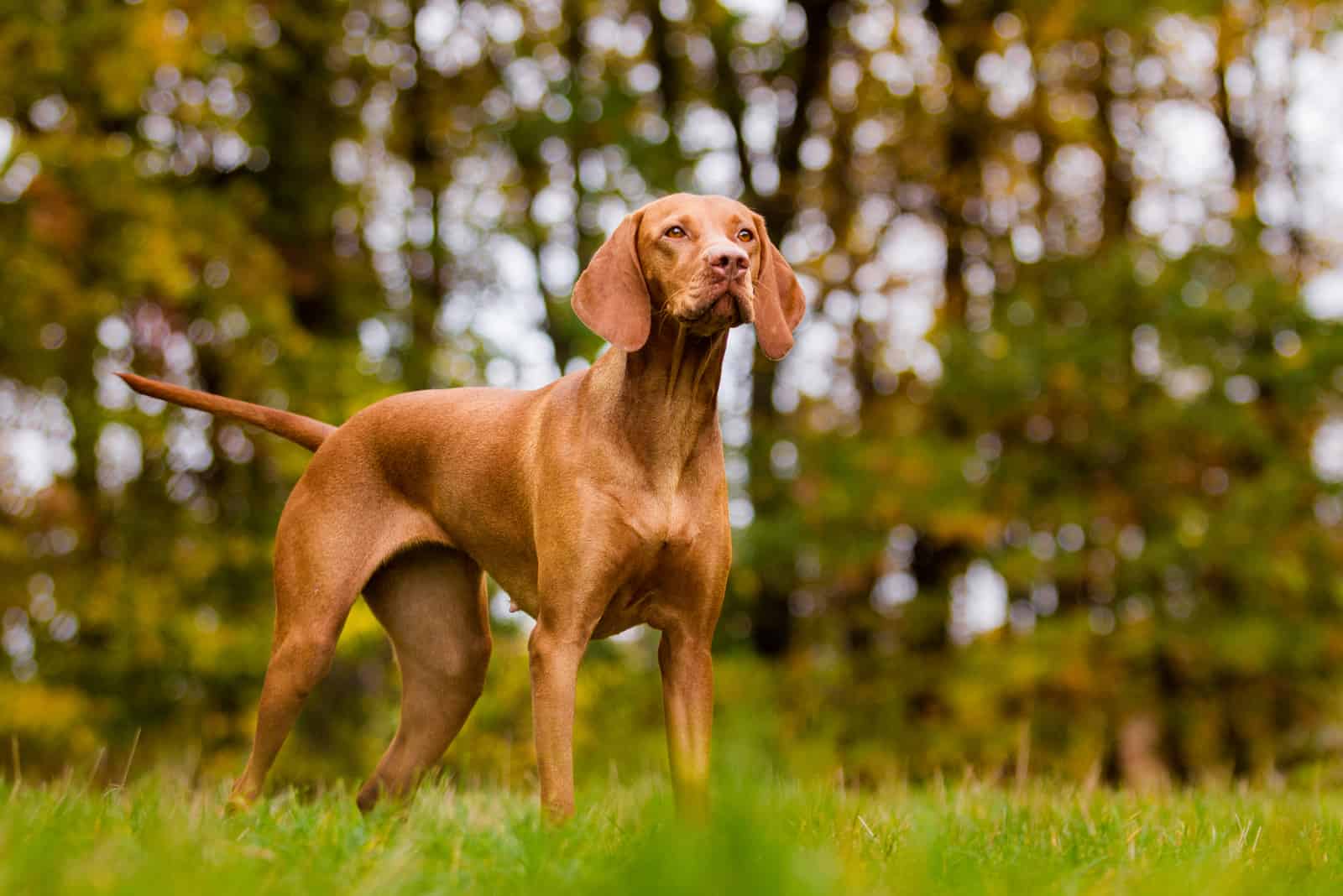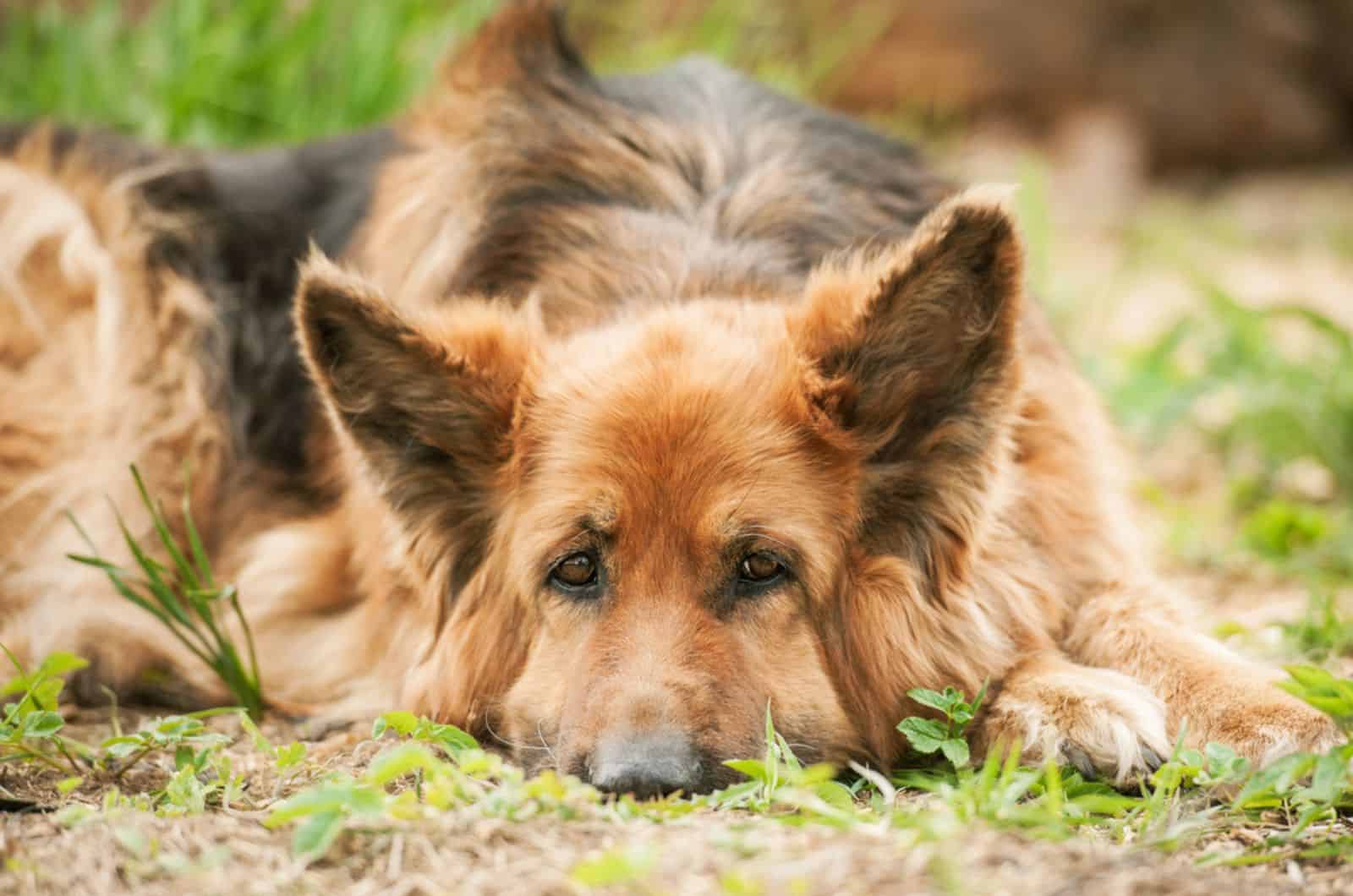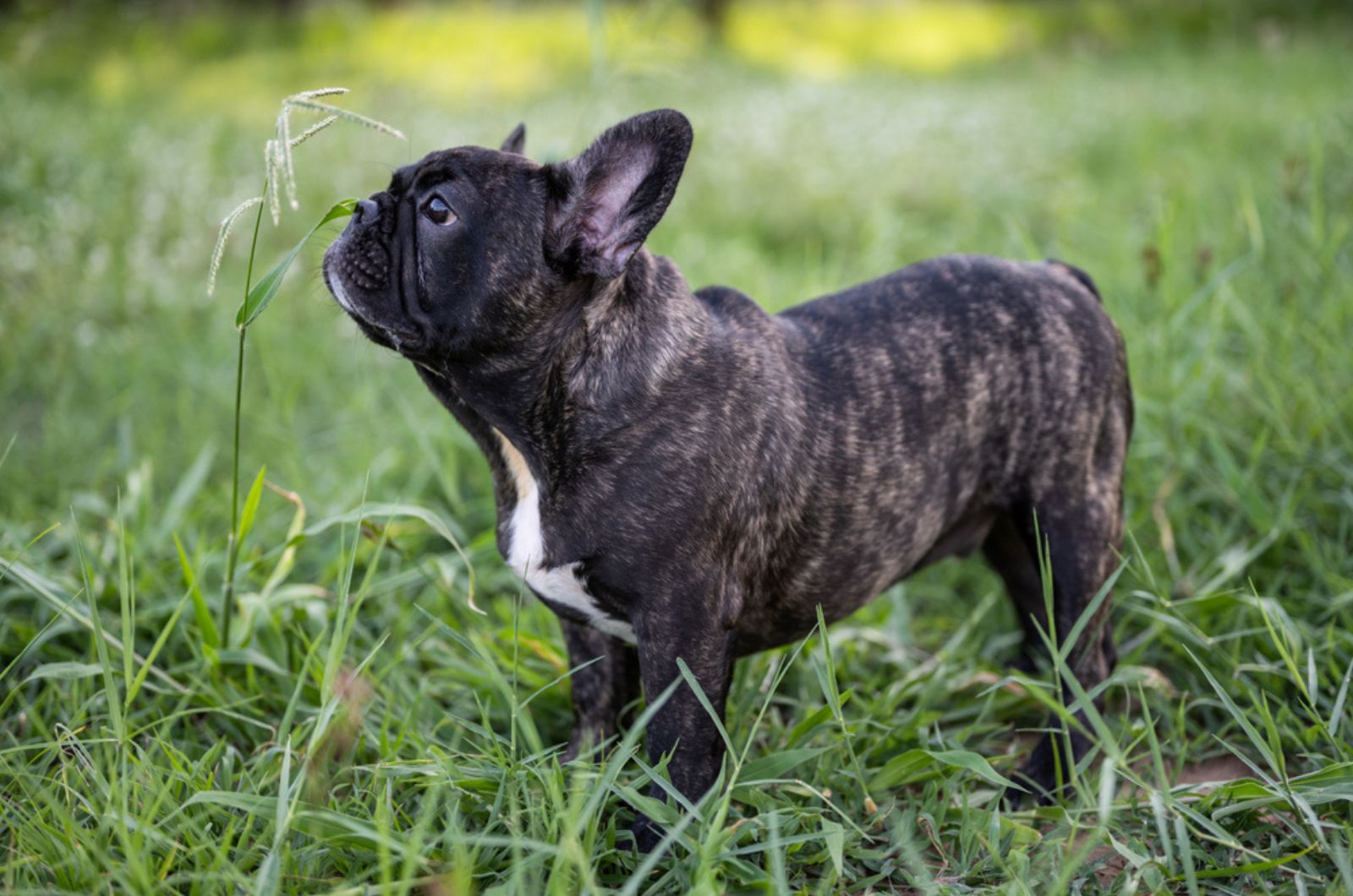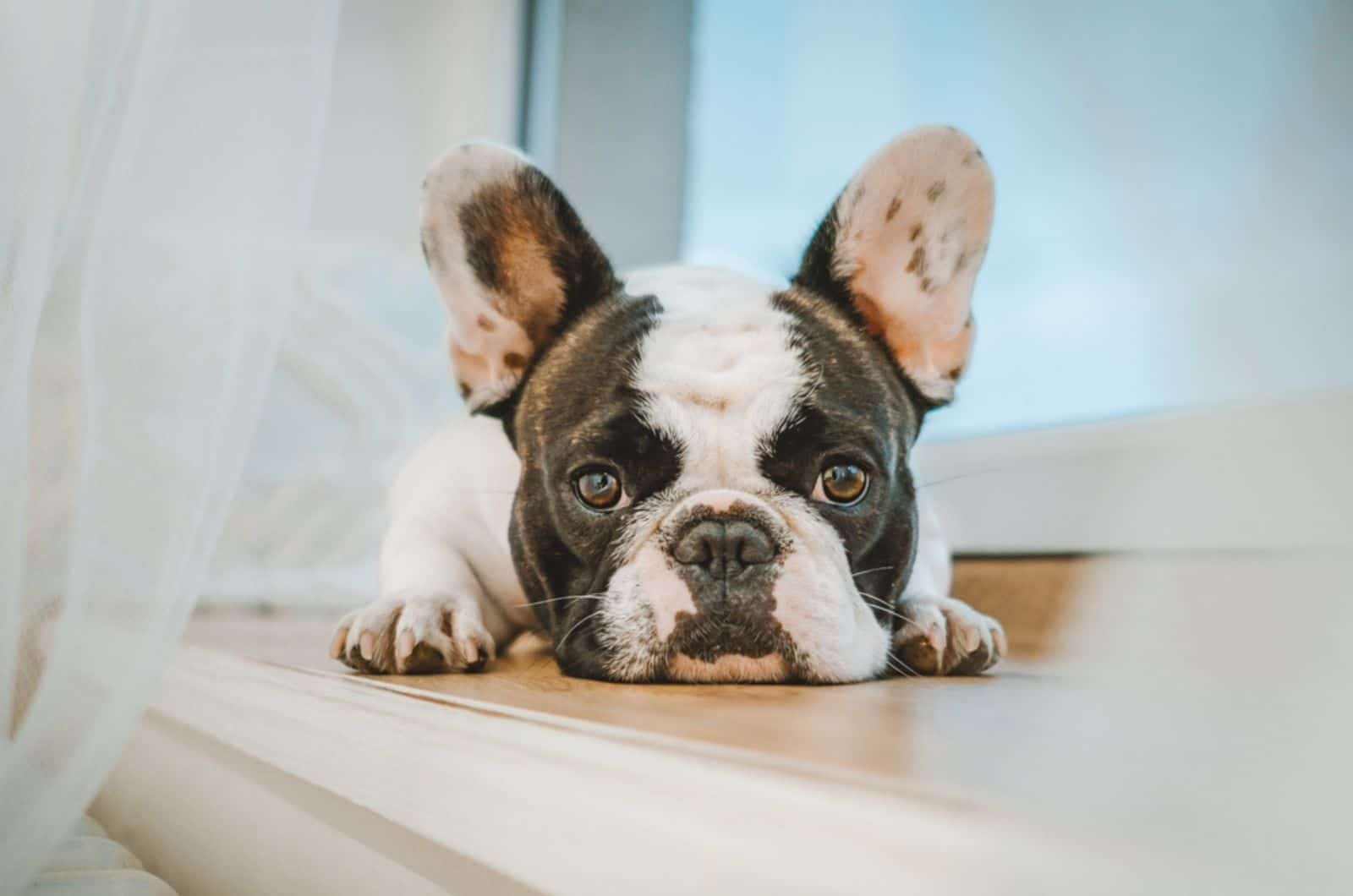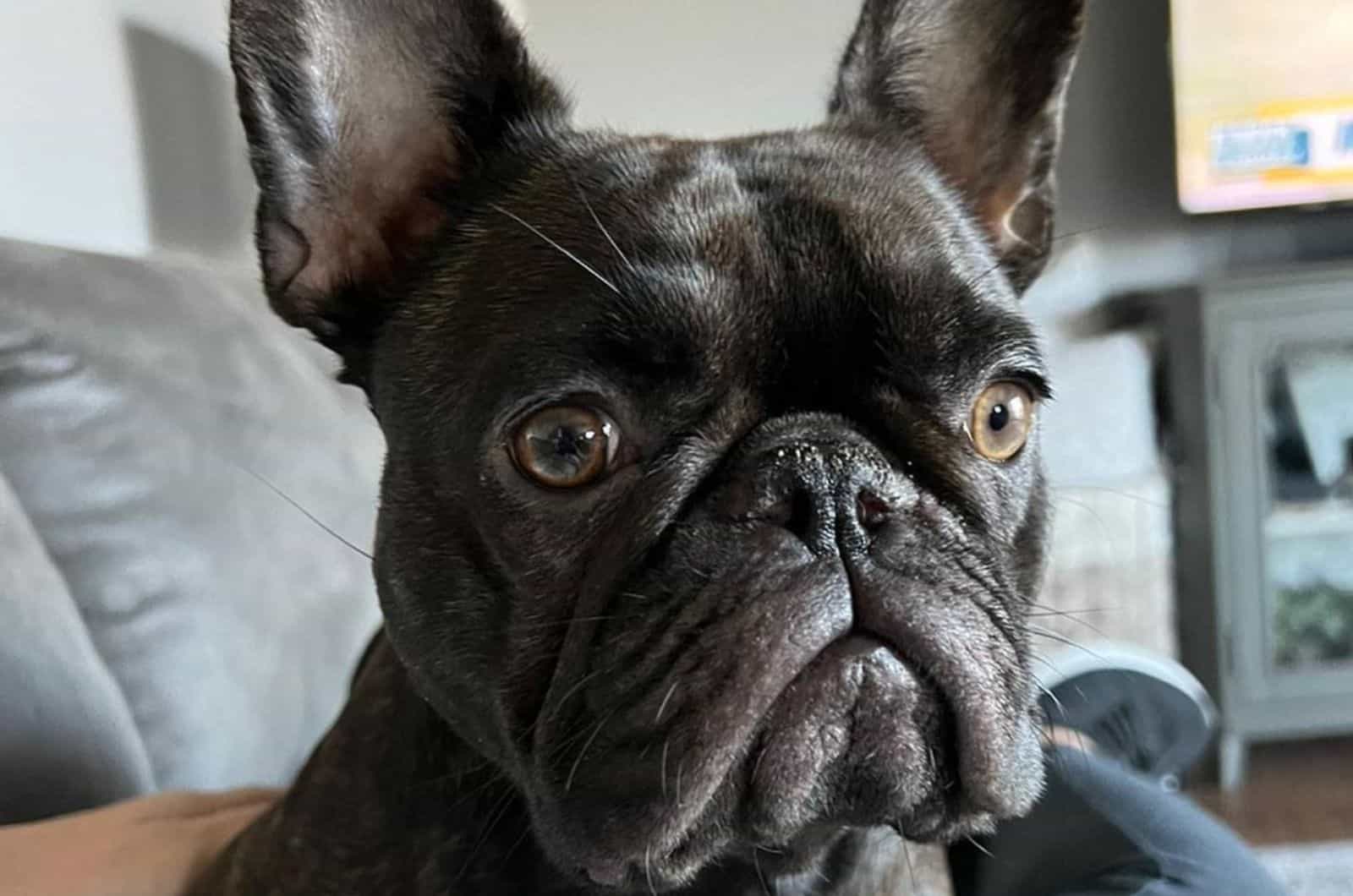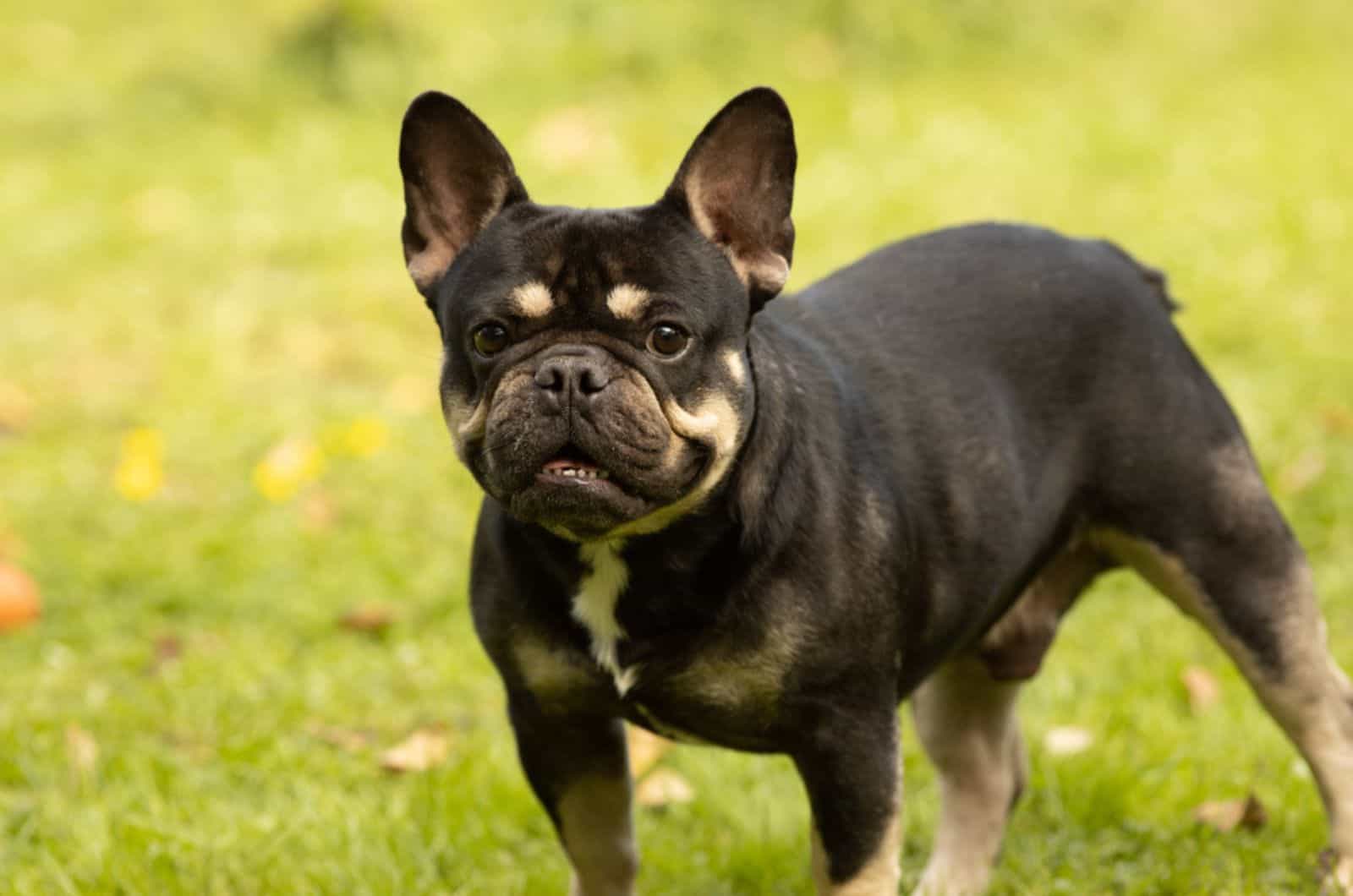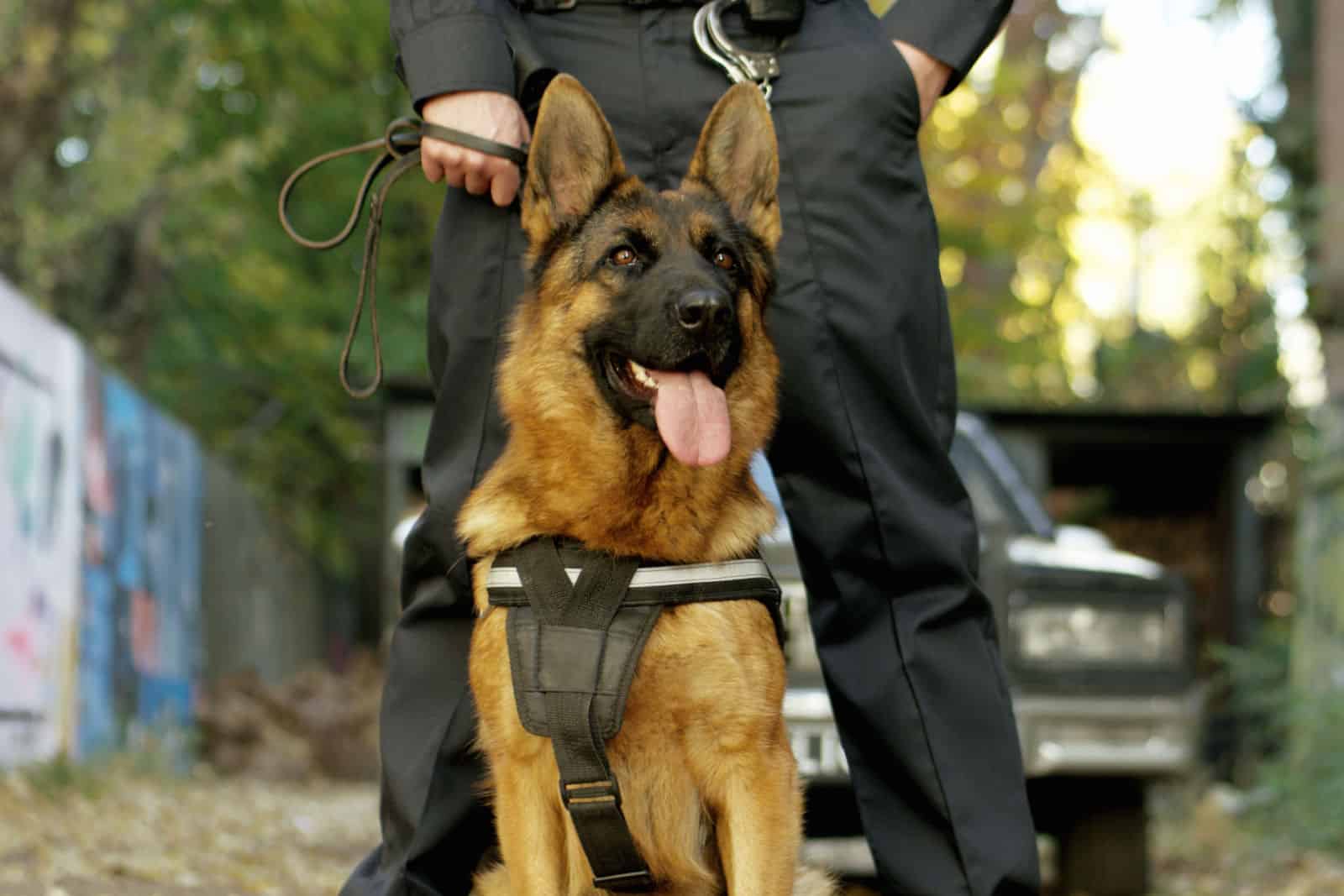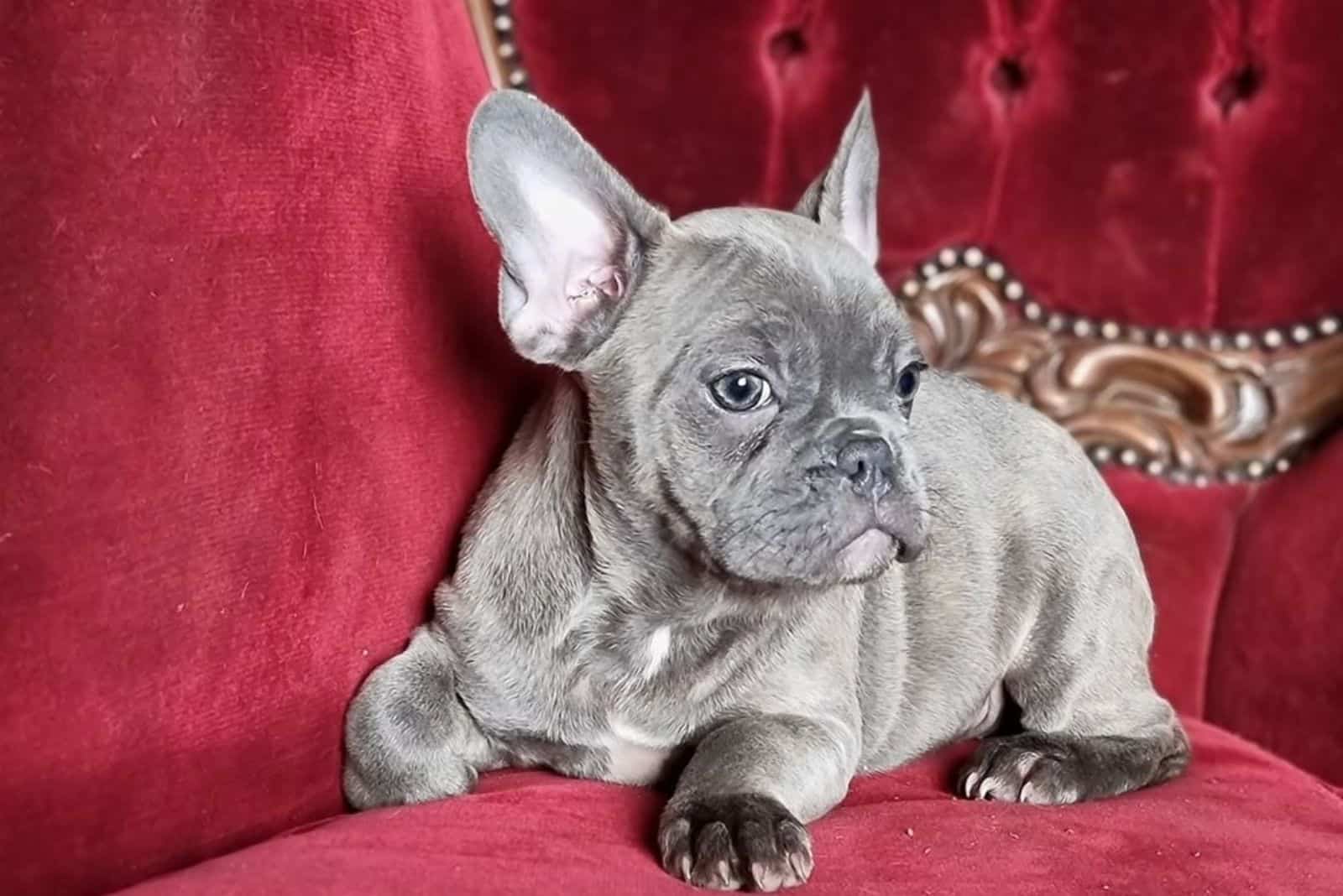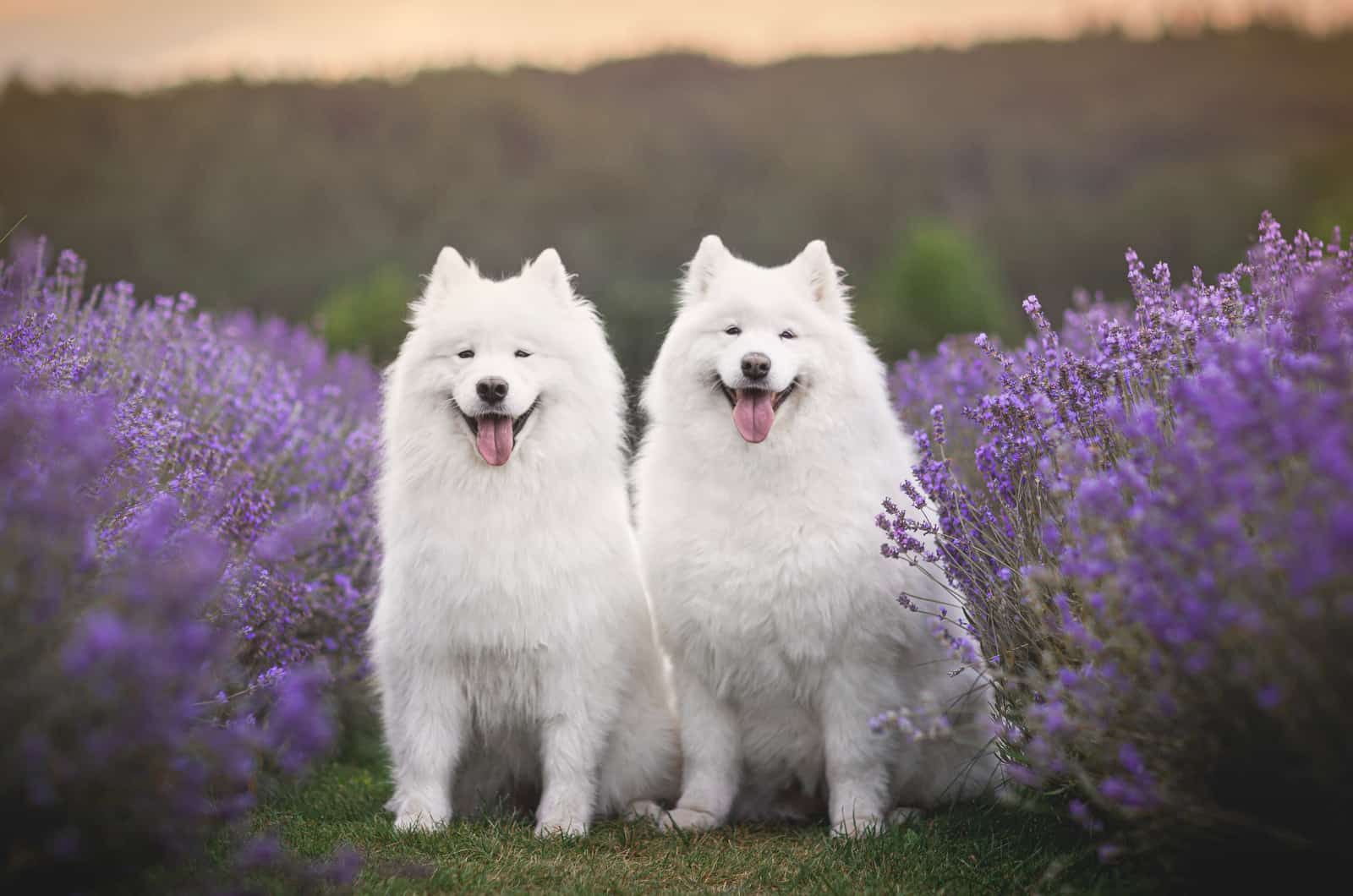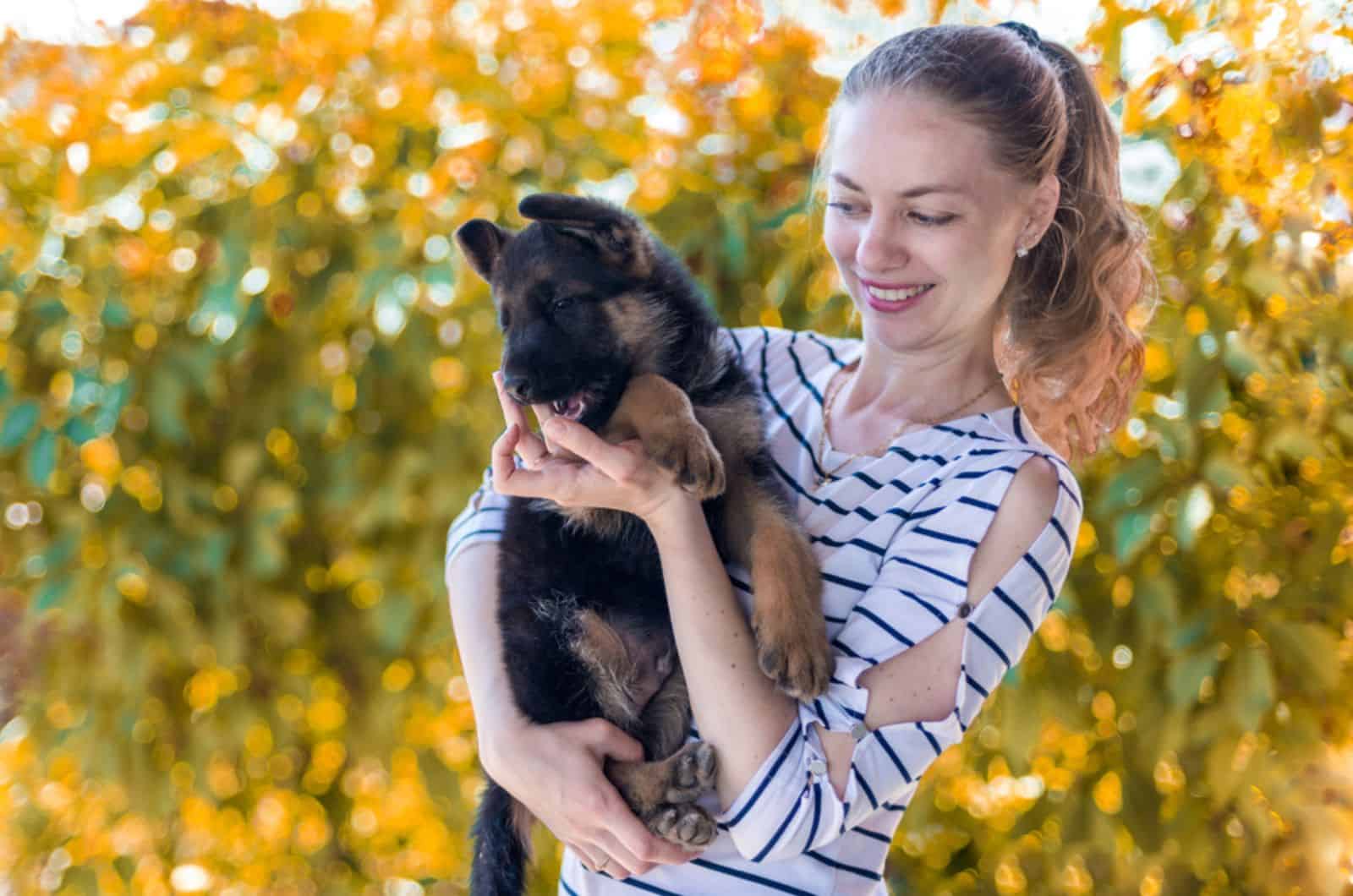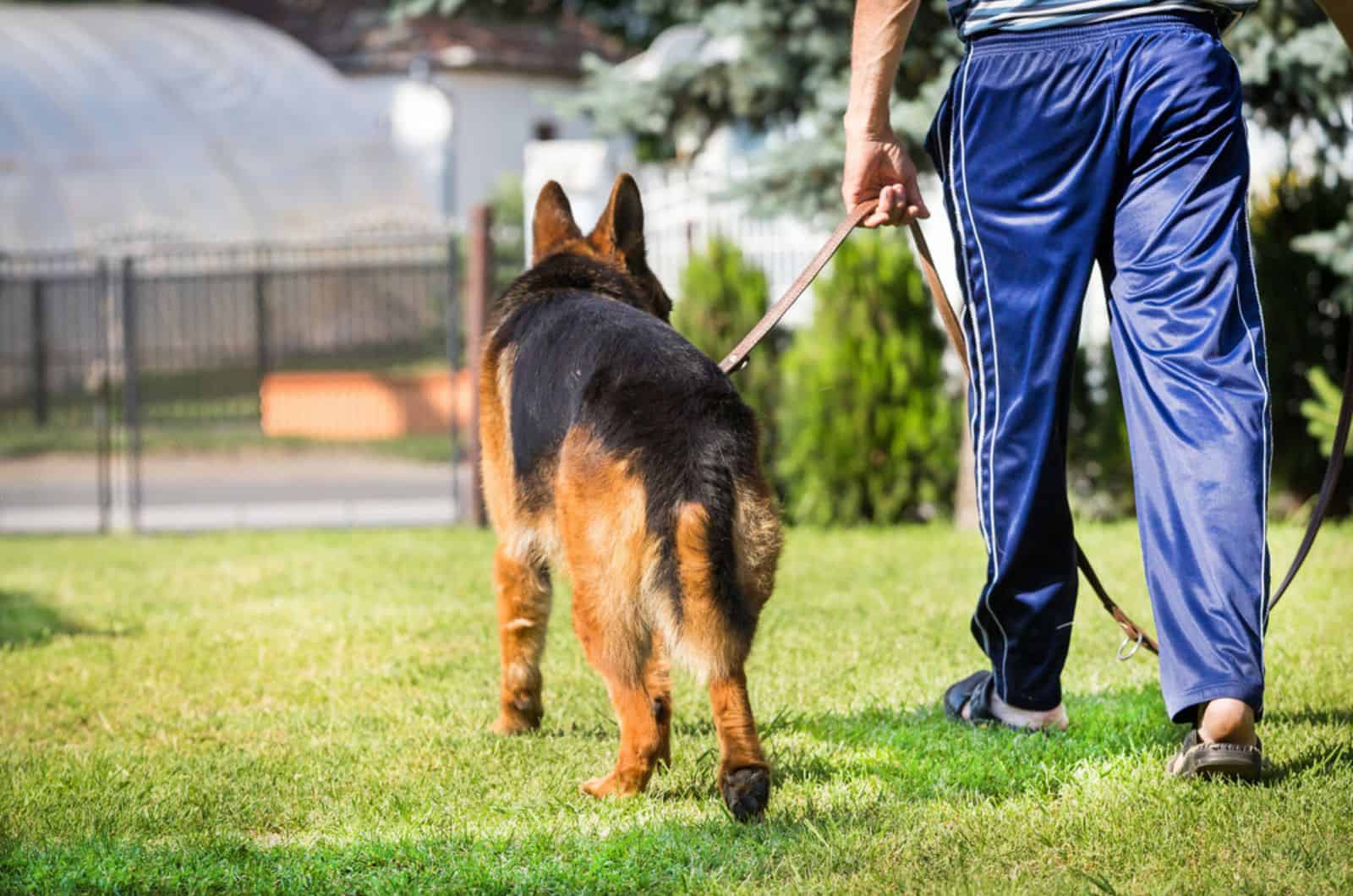Miniature, standard, and giant—we love all the shapes and sizes of the Schnauzer dog breed. Today, we want to talk about all the beautiful Schnauzer colors.
Whether we’re talking about the Miniature Schnauzer breed, or its larger sizes, all purebred Schnauzer dogs inherit double-layered coats. Both of the layers are different—the undercoat is as soft as a feather, while the overcoat is more coarse and wiry.
You are probably picturing a gray or black Schnauzer, right? Well, you might be surprised to find out that there are more than three standard Schnauzer colors.
Giant, standard, and miniature Schnauzer colors all range from patterned to solid colors. So, besides the official Schnauzer colors described by the AKC breed standards, there are many more colors that most of us aren‘t aware of!
Schnauzer Colors According To Breed Standards
If you’re focused on breeding or purchasing show dogs, you might find the information on Schnauzer colors according to the breed standards quite useful.
If someone was to ask for a brief answer to the question: How many colors does a schnauzer have?
The answer would be three.
According to the American Kennel Club (AKC) breed standards, the Schnauzer dog breed comes in three distinct coat colors:
• salt and pepper
• solid black
• black and silver.
Only solid black is a one-color combination, while both salt and pepper and black and silver are two-color combinations that can range in contrast and hue.
1. Salt And Pepper Schnauzer
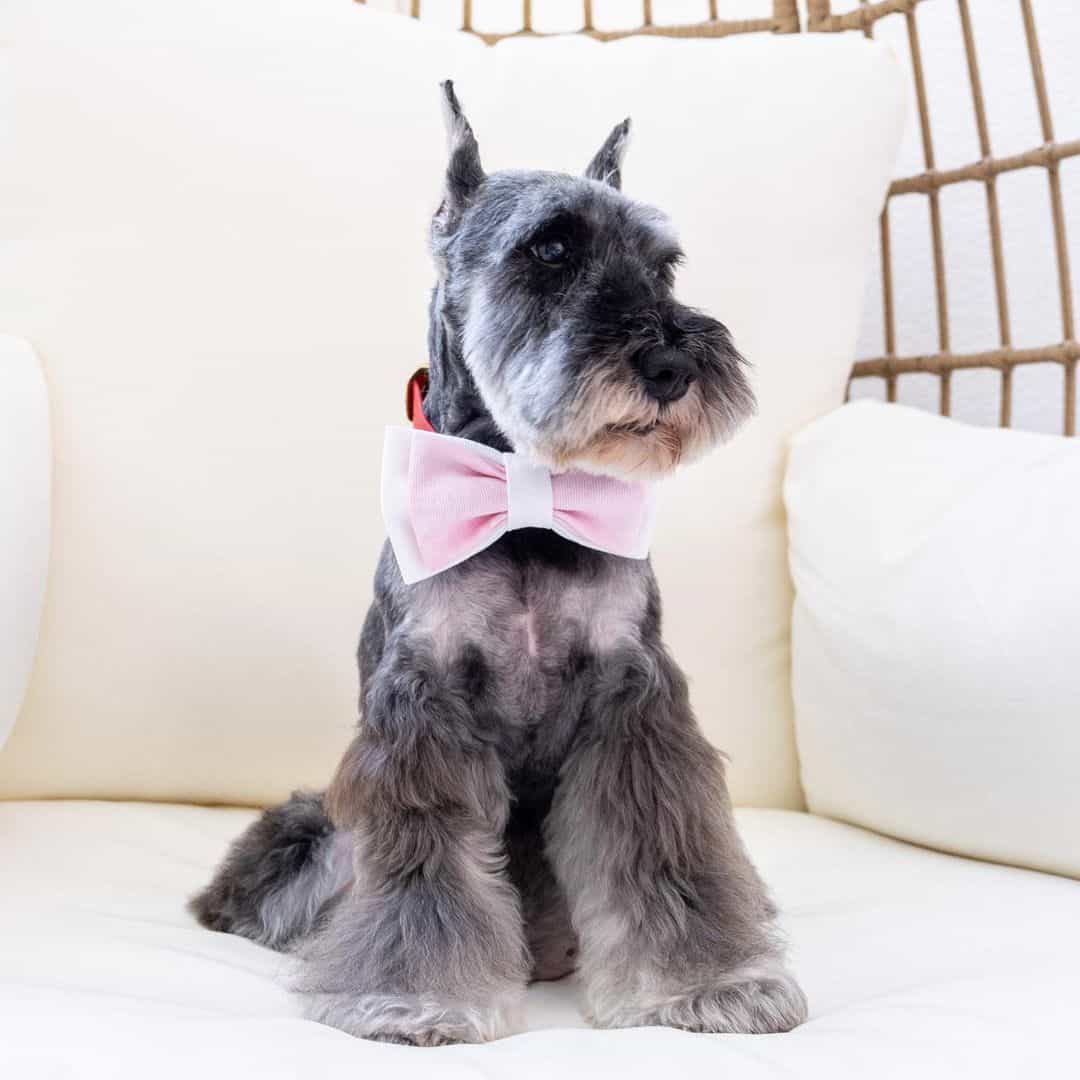
Photo from: @masontheschnauzer12
Are these Schnauzer dogs actually seasoned with salt and pepper? Noo!
Out of all the Schnauzer colors, the salt and pepper variation is one of the most common and popular. The term salt and pepper applies to the Schnauzer’s funky colors. These colors are usually seen in miniature and standard Schnauzers.
A Salt and pepper Schnauzer’s coat is made up of an unusual mix of silver, gray, white, and black—just like the salt and pepper mix!
As for its cute puppy face, it can be colored in patches of solid colors. Usually, a salt and pepper Schnauzer’s ears are colored in black or dark gray.
The majority of this color mix is concentrated on the torso and limbs. This gives the salt and pepper Schnauzer the appearance of ash as well. We might start calling it the Ashy Schnauzer!
2. Black And Silver Schnauzer
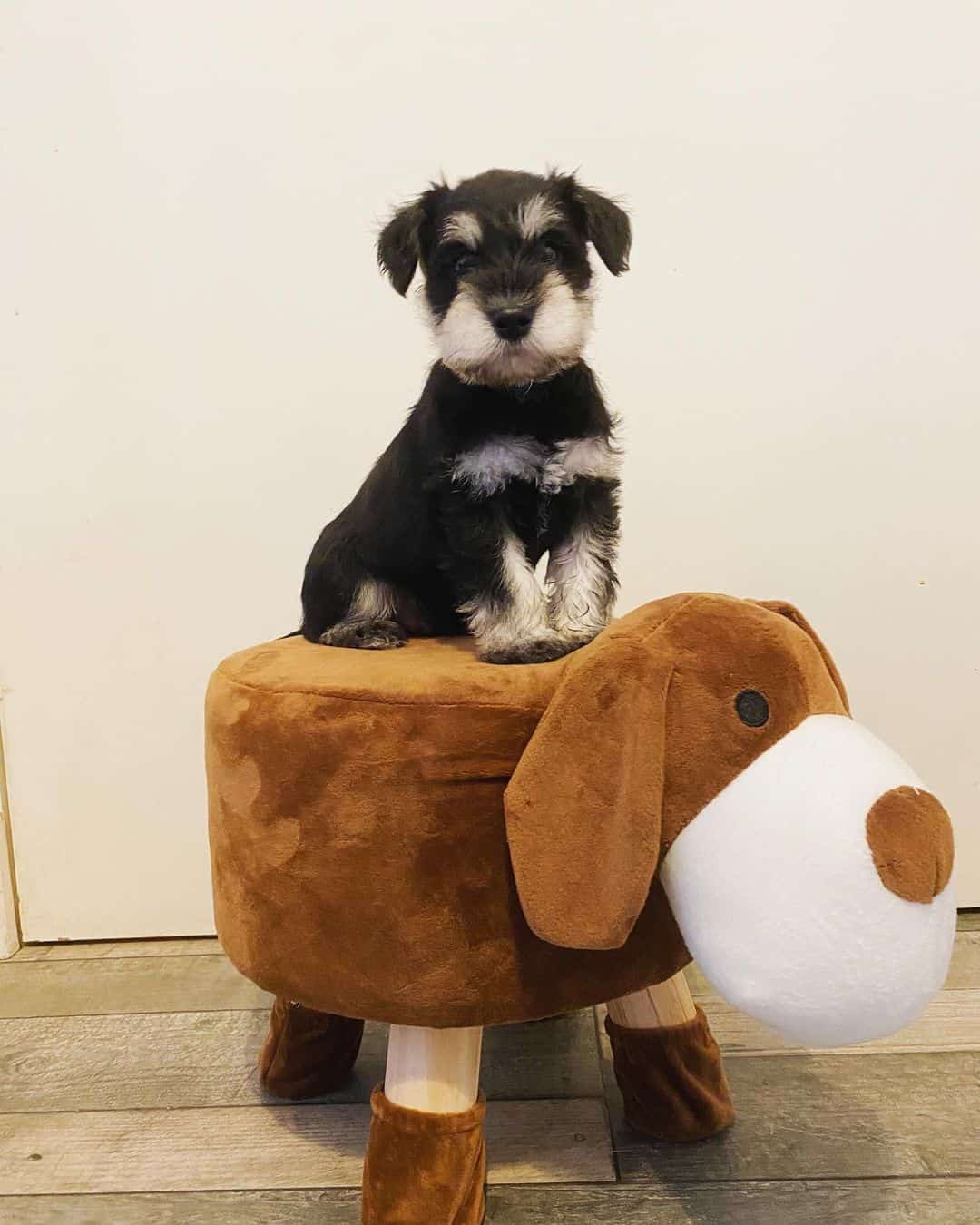
Photo from: @kingston_schnauzers
Black and silver Schnauzers are bicolor snouters that are among the most unique pooches. As teeny tiny puppies, black and silver Schnauzers inherit their solid black bodies.
At birth, their little bodies are covered with copper or bronze markings that seem to turn white as the Schnauzer pups grow older. These specific color markings are located almost everywhere!
We can see bronze markings on black and silver Schnauzers’ brows, muzzles, inner ears, chesst, paws, under and on top of their tails.
Despite the fact that the two colors are somewhat similar in shade, the silver and black parts have a very sharp contrast. This is why black and silver Schnauzers are also known as Phantom Schnauzers. However, Phantom Schnauzers come in different color variations, which we will cover later in this article.
White markings may appear on some black and silver Schnauzers. These are usually found on the Schnauzer’s withers, but they can also be found on their chest and paws.
Additionally, almost all black and Silver Schnauzers are born with a black nose, black pads, and dark colored eyes.
A wiry outer coat and a finer undercoat are both present on Schnauzers. Each coat is typically a different hue, but over time, due to genetics, aging, health and diet, hair loss and regeneration, as well as trimming, they can all change.
There was once this miniature Schnauzer that I had the opportunity to work with. It had a magnificent black coat as a puppy, but after a few years, it had almost completely turned gray. So, that can happen too!
3. Solid Black Schnauzer
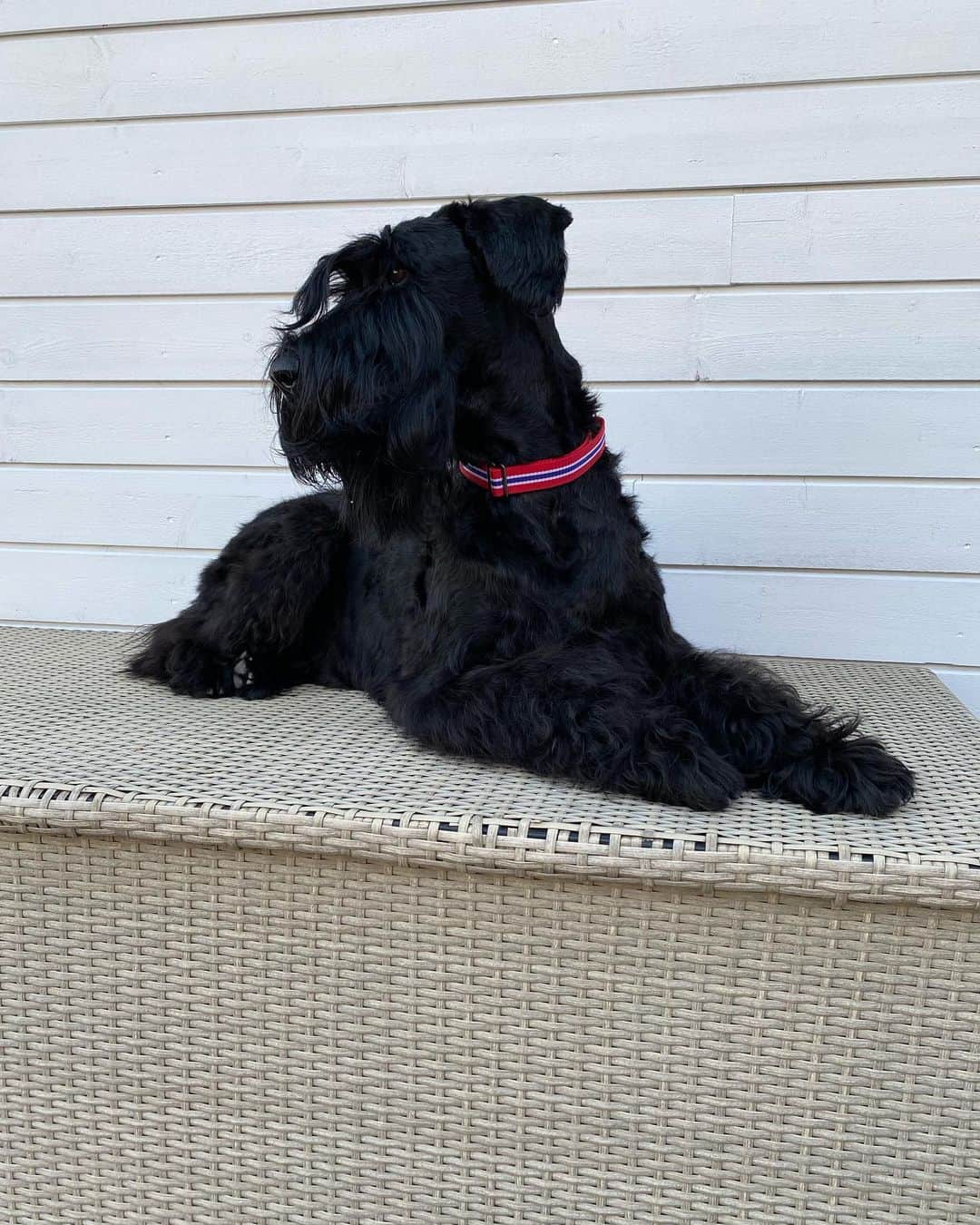
Photo from: @safari_the_queen
One of the most popular standard coat varieties of the Schnauzer dog breed is pure, solid black. Giant Schnauzers, whose only other known variety is the salt and pepper, are particularly prone to it.
The solid black coat color is only somewhat prevalent in both miniature and standard Schnauzers because there are so many other color options.
One black Schnauzer parent dog may be enough to develop a black Schnauzer puppy, since the genes that give these dogs their distinctive black coats are dominant.
Do Black Miniature Schnauzers stay solid black?
Just like we see in other dog breeds, such as black German Shepherds, the majority of black Schnauzers’ solid black coats will turn a dark gray as they age. As your Schnauzer gets older, its coat is going to be full of white hairs—just like your hair!
As far as dog show requirements according to breed standards go, the black Schnauzer is allowed to have white markings across its chest and paws. However, too many white spots on a solid black Schnauzer may lead to disqualification at dog shows.
Other Schnauzer Solid Colors
Besides the standard three colors of the colorful Schnauzer dog breed, there are other solid coat colors that exist, but they are not within the breed standards.
Despite not being officially recognized by the AKC, these Schnauzer colors are often seen in show rings. That says a lot about how gorgeous these pups are.
Let’s check out some of the frequently seen Schnauzer solid colors.
1. White Schnauzer
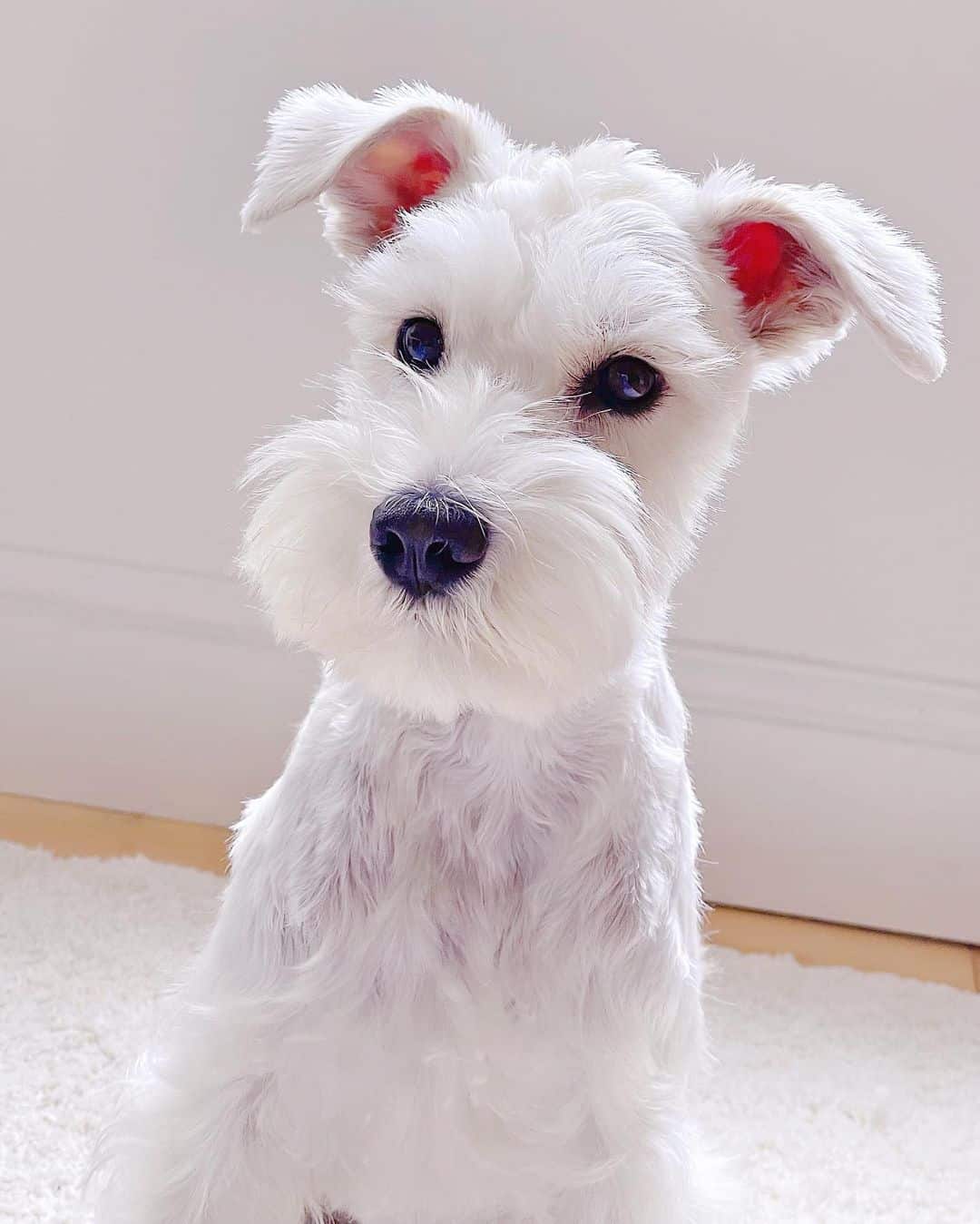
Photo from: @lovebytofu
I know what you have thought and the answer is no—White Miniature Schnauzers are not albino. Their pure white color is what makes the white Schnauzer stand out.
At birth, white Schnauzer puppies are pure white. Compared to other puppies that start off as white and turn spotted (like we see with Dalmatian colors), white Schnauzer puppies stay pure white for the rest of their lives! In other words, their white coat color doesn’t change much as they age.
The white Miniature Schnauzer’s fabulous mane may turn yellow-ish on some parts of its body (around the mouth, ears, paws, and bum) as it reaches its senior years.
The white coat color found in Schnauzers is carried by a recessive gene. So, breeding a white Schnauzer with a salt and pepper Schnauzer, would result in salt and pepper Schnauzer puppies. However, the white coat gene can still be carried by any one of those puppies, and future generation Schnauzer litters may give birth to a White Miniature Schnauzer puppy.
Although white is a beautiful Schnauzer color, the American Miniature Schnauzer Club (AMSC) doesn’t allow it in the show ring. Luckily, owners of white Schnauzers can register them within the AKC and these white snouters can be shown in international show rings.
2. Liver Schnauzer
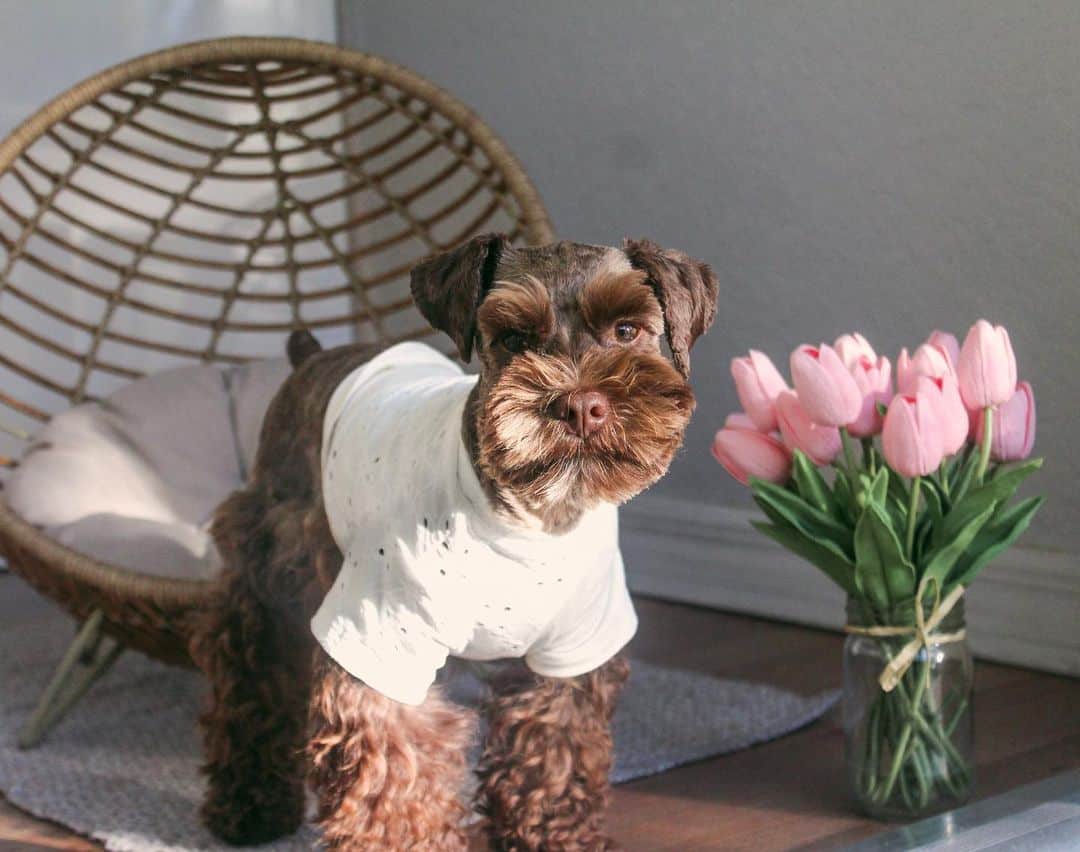
Photo from: @maisieschnauz
Perhaps this name sounds weird, but trust me, the liver Schnauzer doesn’t have anything to do with livers. Instead, the term ”liver” refers to a shade of brown (chocolate) color.
Liver Schnauzers are ultra cute—they inherit chocolate noses and light to dark brown eyes. Their coats are very shiny and once they are neatly brushed out, liver Schnauzers look very fluffy!
Besides a cute chocolate nose, the liver Schnauzer’s tippy toes are colored in dark brown too.
Its solid colored coat may have white markings and banded hairs that are darker in color. In these cases, we are talking about rare colors.
Purebred Schnauzers are not the only ones that come in this color variation. We are also familiar with liver German Shepherds and liver Shih Tzus!
Rare Schnauzer Colors And Patterns
I am sure that this is the most anticipated part of the article. Most potential Schnauzer owners are always curious about rare colors of this breed.
If standard Schnauzer colors look so cool, I can’t even begin to describe how cool these rare colors look!
1. Liver And Tan Schnauzer
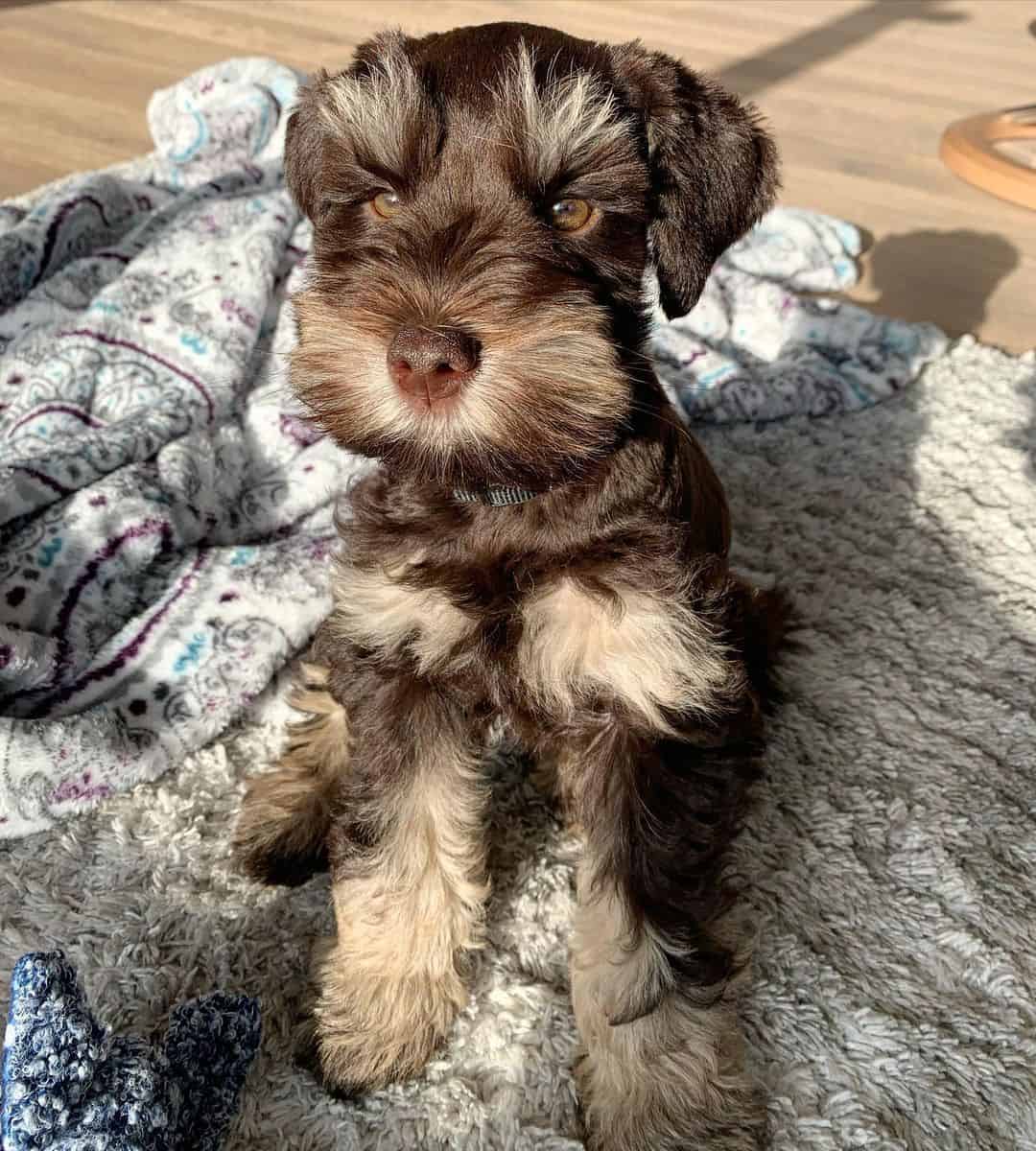
Photo from: @wagstheminischnauzer
Since we mentioned the solid liver colored mini Schnauzer, it would be a good idea to introduce you to some liver color variations too. The first one is liver and tan. In other words, this is a color combination of chocolate tones and light brown to tan colored patterns.
This unique combination makes the mini Schnauzer look like a little teddy bear! It has tan markings across its chest, on its fabulous mustache, and on its paws. The tan color markings on a Schnauzer’s paws make it look as if it’s wearing ankle socks!
The liver and tan Schnauzer is a breathtaking pup that is guaranteed to steal your attention!
2. Salt And Pepper Parti Schnauzer
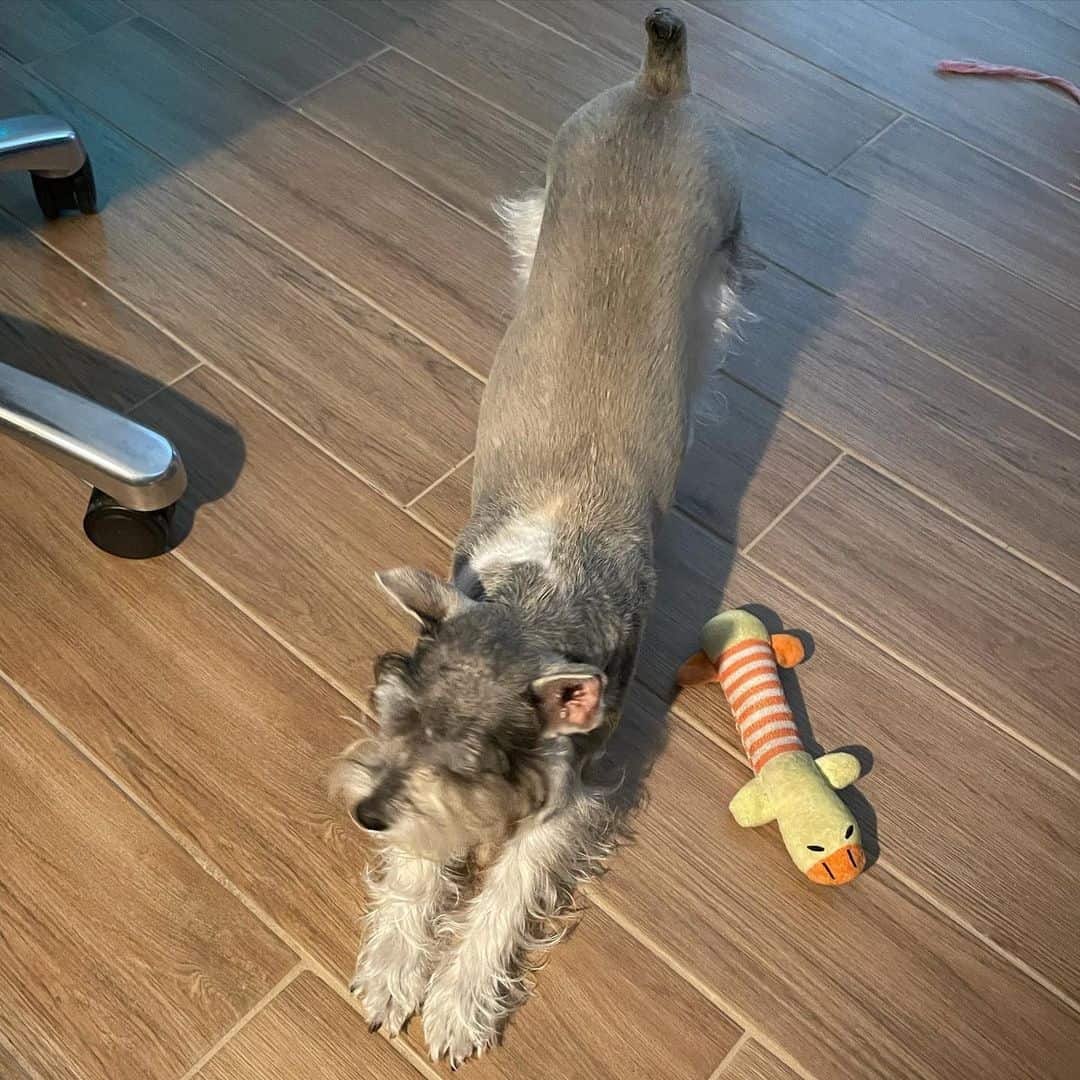
Photo from: @schnauzers__diaries
Okay, so we just talked about salt and pepper Schnauzers. But, what about salt and pepper PARTI Schnauzers?
What does “parti” even mean?
A parti pattern in the salt and pepper parti Schnauzer means that there are bigger white patches located across its body. It’s not just the usual small white patch across its chest. We’re talking about big chunks of white coat color in combination with salt and pepper color shades.
For example, there is often a white marking that is present on the salt and pepper parti Schnauzer’s snout. It spreads all the way up to its forehead, making the salt and pepper color visible around its eyes.
When we take a closer look at the salt and pepper parti Schnauzer, we can see that there are white markings that spread along its tummy, all the way down to its legs and paws.
3. Liver Parti Schnauzer
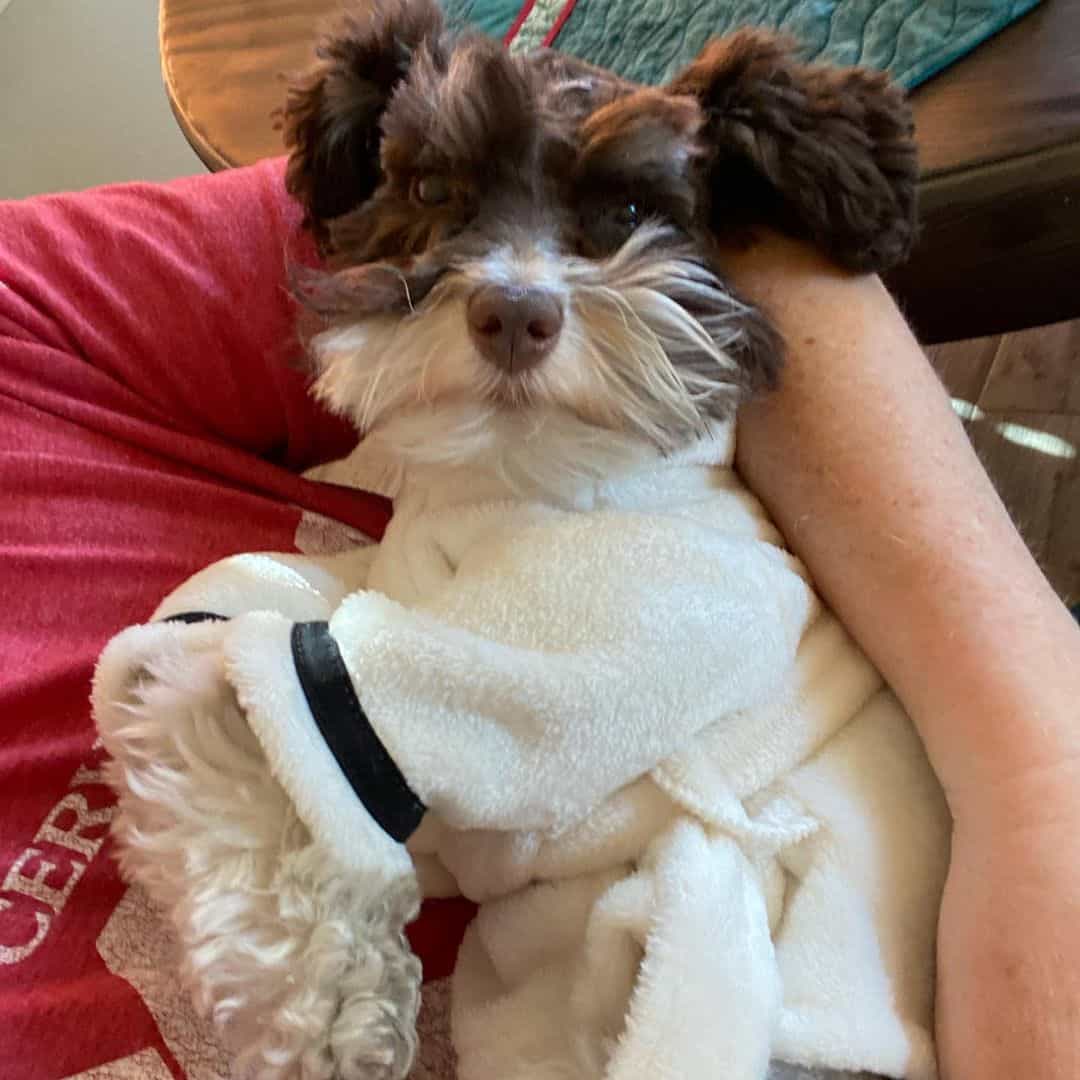
Photo from: @dixie_the_parti_girl
Similar to the above described Schnauzer colors, the liver parti Schnauzer’s base color is liver AKA chocolate, but a large amount of its body is covered by white markings.
These white markings can be located anywhere on the body. Most of the white markings are seen on a Schnauzer’s mustache, muzzle, forehead, belly, and fore- and hind-limbs.
The cutest thing about liver parti Schnauzers is that their little tails often have a white colored tip. This is a similar tail trait that we see in Basset Hound coat colors.
4. Liver/Tan Parti Schnauzer
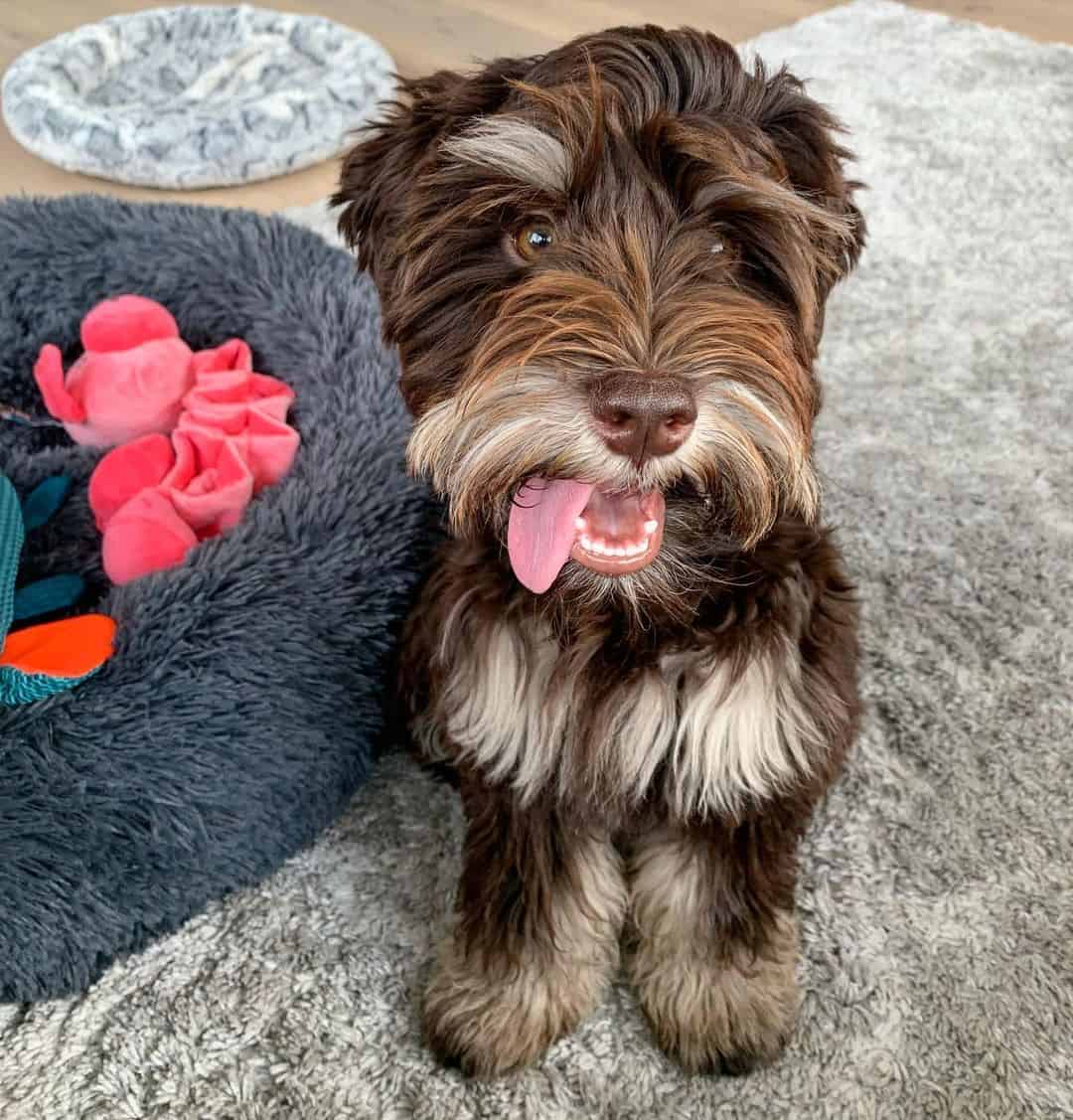
Photo from: @wagstheminischnauzer
We talked about white markings on a solid liver Schnauzer color. Now it’s time to introduce tan markings, which is a small change, but they make a big difference to a Schnauzer’s appearance.
Liver/tan parti Schnauzers inherit tan to light brown patterns all over their bodies. Some Schnauzer lovers describe these tan patterns as “chocolate spots”. Whatever you want to call them, these color patterns are the cutest!
Tan markings can be seen on a Schnauzer’s muzzle, eyebrows, mustache, and across their forehead. As for the rest of the body, well, they can be located anywhere. All liver/tan parti Schnauzers are very different from each other!
5. Liver Pepper Schnauzer
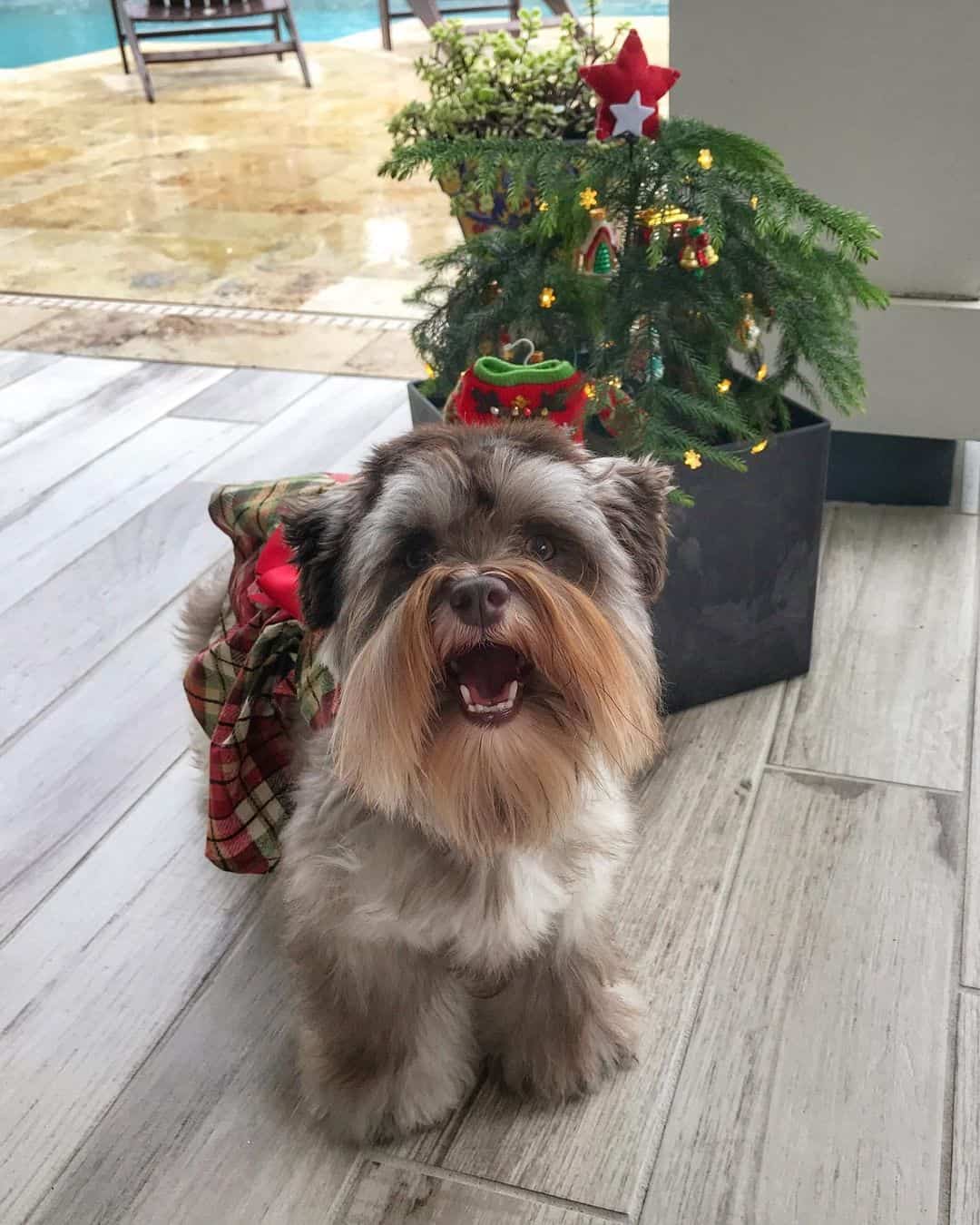
Photo from: @benjibeboo
The Liver pepper Schnauzer looks almost the same as the liver tan Schnauzer. But, no two Schnauzers ever look the same—there is a visible difference in coat colors between these two.
The liver pepper Schnauzer inherits banded hairs and this makes the biggest difference. Basically, the liver pepper Schnauzer’s strands of hair are tri-colored. It comes in three different shades of liver/brown/chocolate.
An interesting fact about liver pepper Schnauzers is that they inherit chocolate noses and light brown to green eyes! Their eyes really pop out, especially when their coat color is darker.
To make it easier, just imagine a salt and pepper Schnauzer, but instead of salt, imagine a liver color!
6. Phantom Schnauzer
Some people may have trouble differentiating between a black/silver parti and a phantom Schnauzer because there are almost no noticeable differences in their color shades.
This is because phantom Schnauzers appear as lighter versions of black/silver parti Schnauzers. Their color hue is seen right at birth. And most people say that black/silver parti and phantom Schnauzers are the same Schnauzer colors, just with different shades.
7. Wheaten Schnauzer
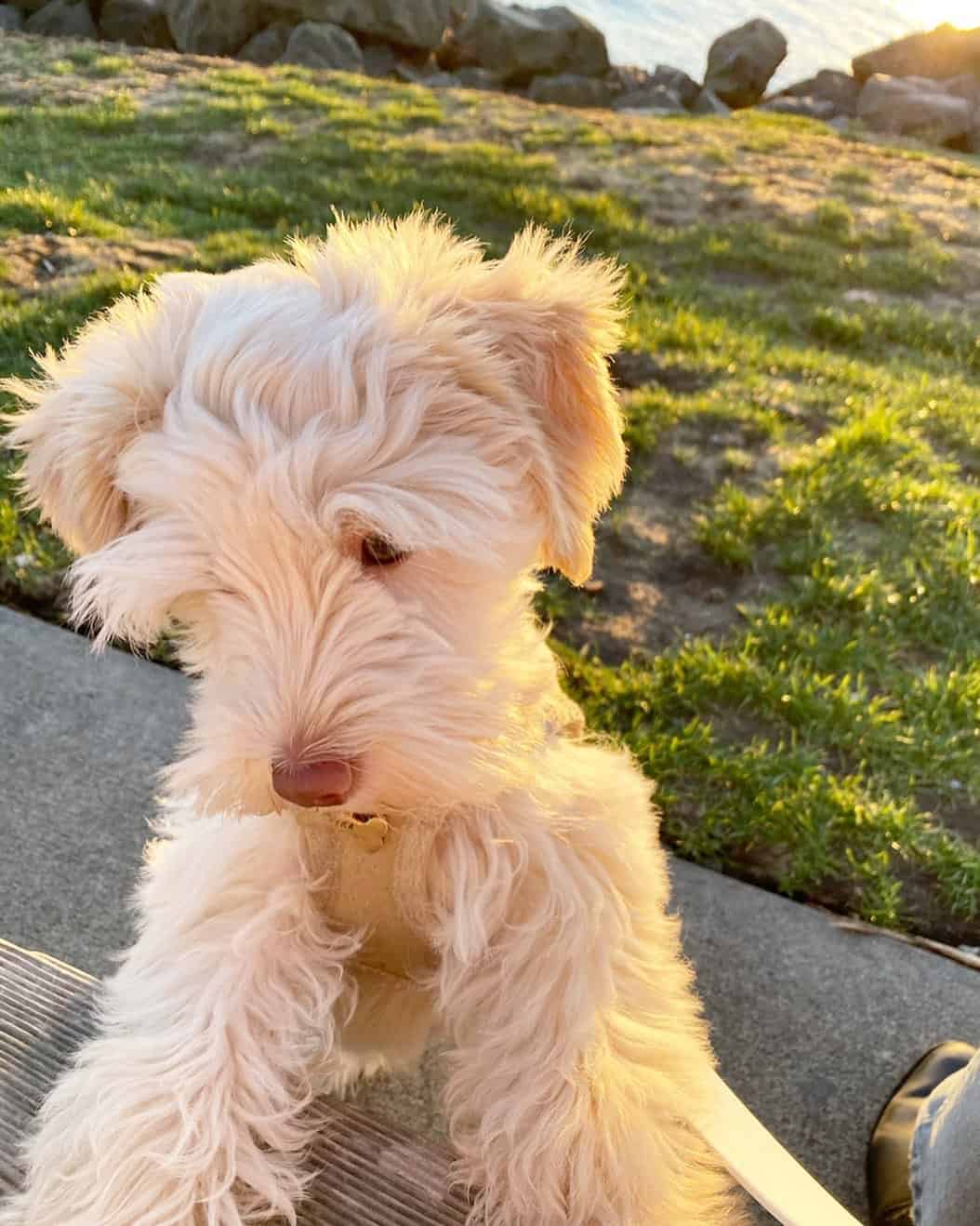
Photo from: @butfirst.fika
Due to the fact that there are popular terrier breeds, like the Wheaten Terrier, most dog lovers get confused and think that a Wheaten Schnauzer is a Terrier crossbreed. Well, it is not.
The wheaten Schnauzer resembles a variety of color shades. Its banded hairs are colored in shades of red, yellow, brown, or cream. The wheaten Schnauzer is more of an orange to golden color variant. Its remarkable color reminds us of a standard Cocker Spaniel or a Cavalier King Charles Spaniel’s colors.
Wheaten Schnauzers are pretty rare and they make beautiful canine companions. Fortunately, this lovely aesthetic is not linked to any serious genetic illnesses.
8. Black/Silver Parti Schnauzer
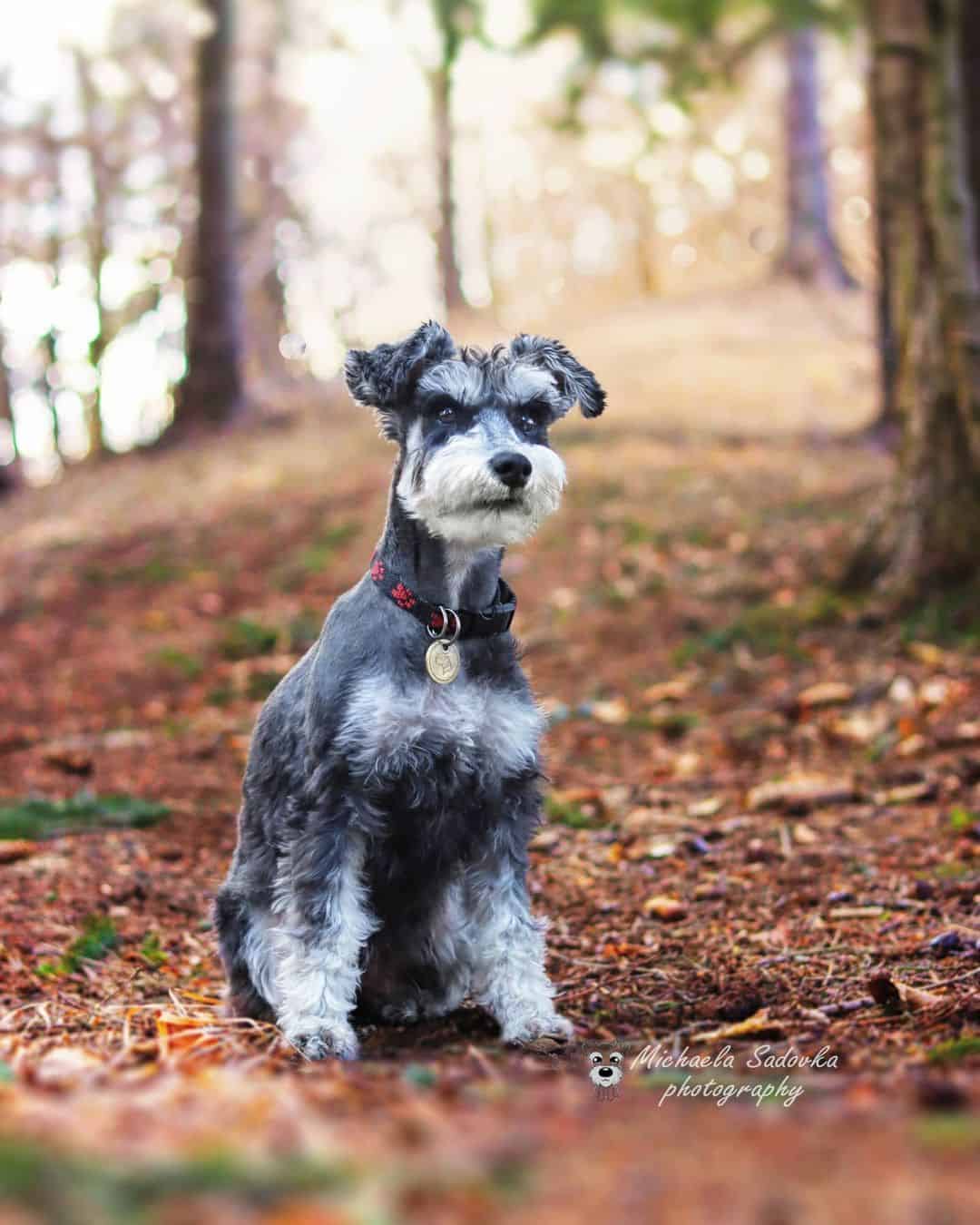
Photo from: @michaela_sadovka
An interesting fact about black/silver parti Schnauzers is that their solid black bodies are covered with copper markings that turn silver as they age!
These markings are located on their snout, on all limbs, across the abdomen and chest, as well as on a Schnauzer’s eyebrows. Sometimes, the copper markings can be found on the tip of the tail or across the whole tail.
If you can’t distinguish a black/silver parti Schnauzer, take a closer look at its black nose, black eyes, and black paw pads!
9. White Chocolate Schnauzer
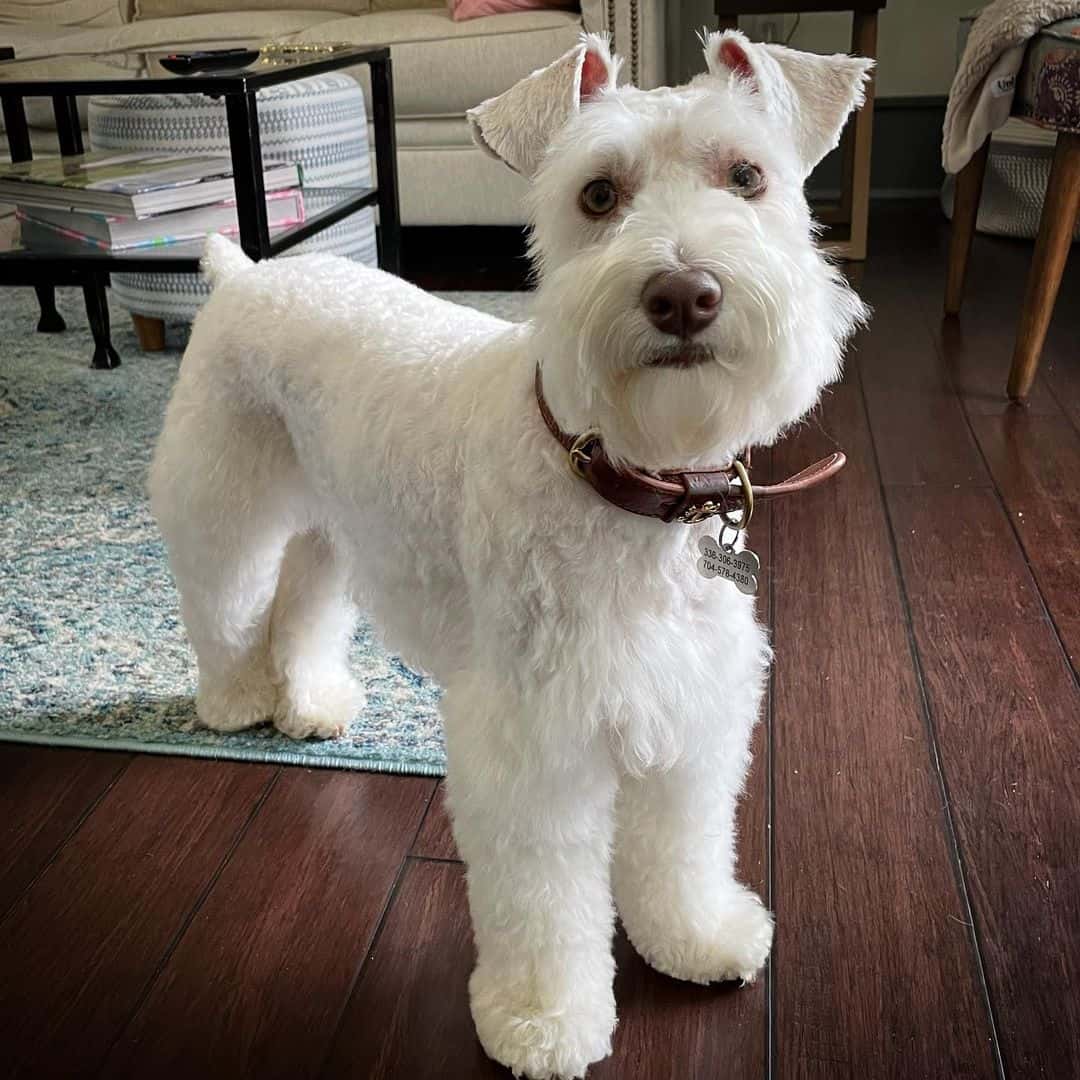
Photo from: @chester_the_white_schnauzer
Let’s take a white Schnauzer and place it next to a white chocolate Schnauzer. It’s hard to tell the difference, right? Well, when you take a closer look at the two, you will notice that white chocolate Schnauzers have brown paw pads and chocolate noses, which are impossible to resist!
White chocolate Schnauzers are lighter than any other chocolate colored dogs, such as the chocolate Havanese.
Sometimes, a white chocolate Schnauzer’s mustache has a light chocolate color on its ends.
10. Black Parti Schnauzer
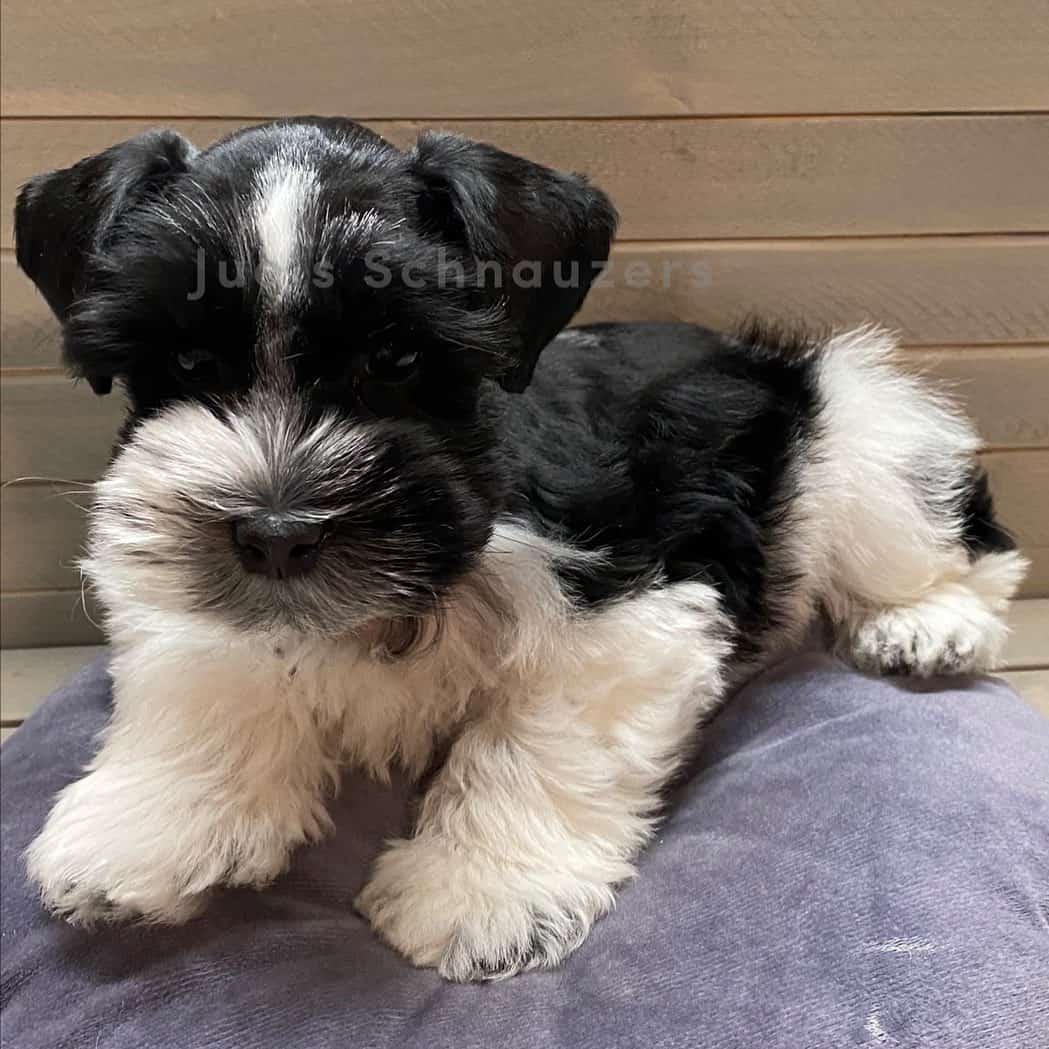
Photo from: @juels_schnauzers
A Black Parti Schnauzer is basically a black and white Schnauzer. Its eyebrows, chest, and mustache are usually colored white, while the rest of its body is covered in solid black.
All black parti Schnauzers are different. Some might inherit white colored limbs, whereas some inherit a solid white body with large black markings across their back.
11. Black And Red Schnauzer
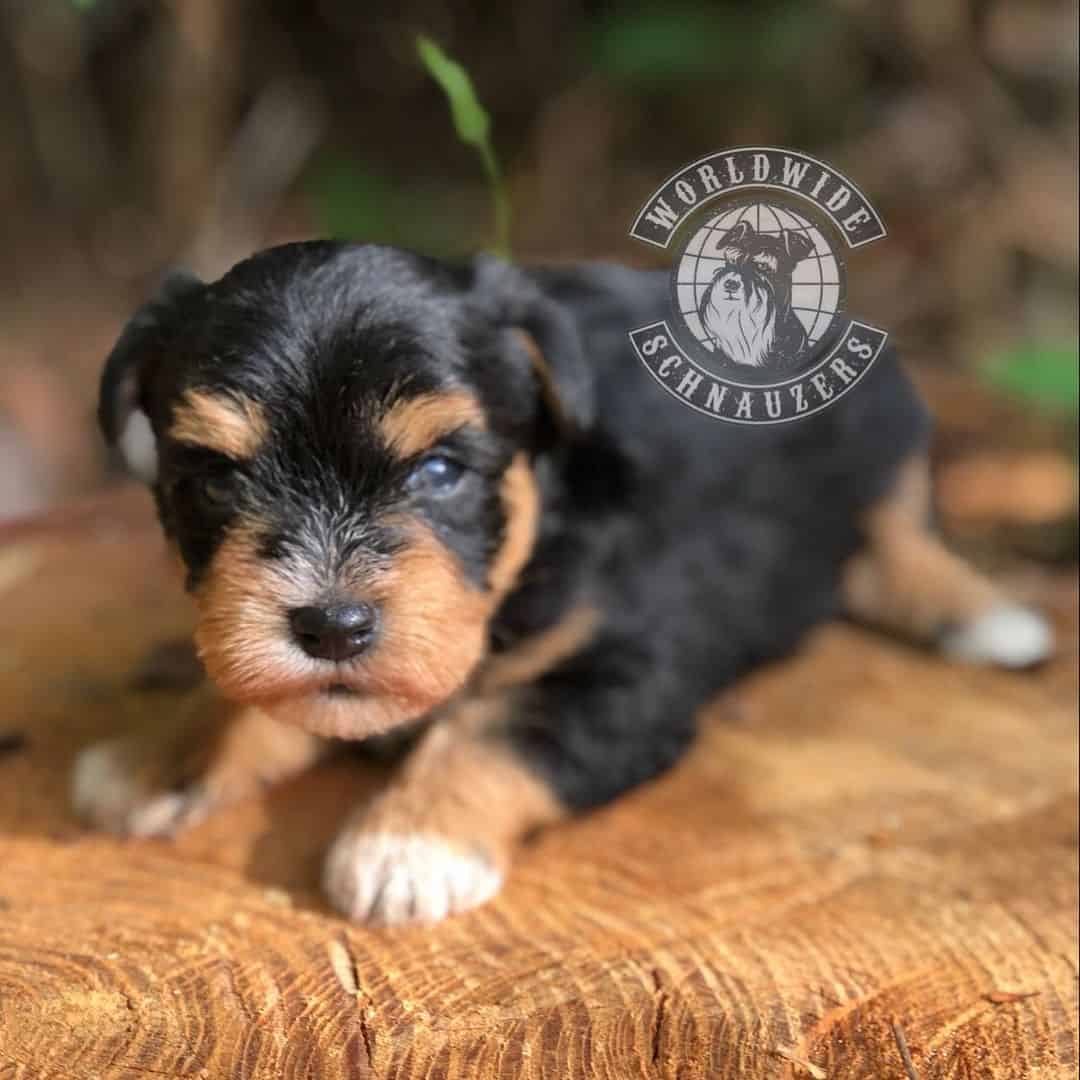
Photo from: @worldwideschnauzers
Probably the rarest Schnauzer color around—the black and red. The black and red Schnauzer comes in a combination of solid black and red to golden colors. These two colors blend beautifully and they make our mini Schnauzer stand out among a crowd.
Black and red is a very unique set of Schnauzer colors and is rarely seen anywhere. If you happen to own one, you’re a very lucky Schnauzer owner!
12. Brindle Schnauzer

Photo from: @theodore_and_mazie
Brindle Schnauzers are multi-colored pups. Similar to brindle Shih Tzus, This Schnauzer’s black base coat looks as if it has been sprayed with light brown to tan stripes. On the other hand, black stripes are seen on the lighter colored Brindle Schnauzers.
These stripes may go unnoticed, as they are discreetly dispersed across the brindle Schnauzer’s body.
13. Merle Schnauzer

Photo from: @musikdog
Merles are my favorites! Merle Schnauzers are truly remarkable pups that come in interesting patterns. Silver, brown, gray, black, and white—all of the Schnauzer colors seem to spread on the body of a merle Schnauzer.
Most of the time, there are brown or gray spots across the back of a merle Schnauzer. Merle is a beautiful color combination that is seen in many other dog breeds, such as the merle English Bulldog or the remarkable merle Poodle!
It is said that merle Schnauzers are, in fact, crossbreeds. The thing about merle Schnauzers is that they most likely don’t inherit the Schnauzer’s hypoallergenic coat.
14. Platinum Silver Schnauzer
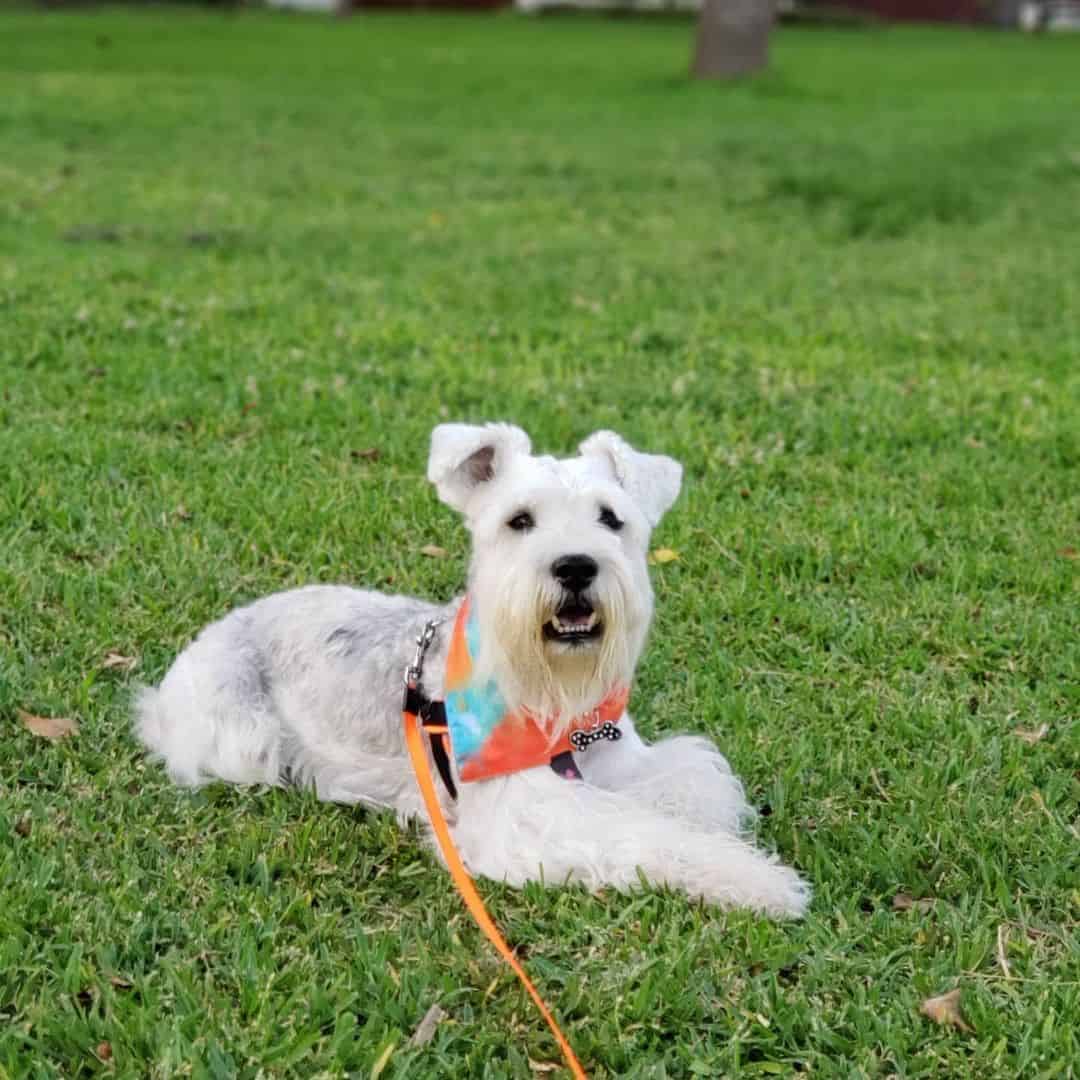
Photo from: @valentino.y.nicolas
You might have guessed that platinum silver Schnauzers are very light in color. And, you are right—the Platinum silver Schnauzers are indeed, lighter versions of their salt and pepper counterparts.
Platinum silver Schnauzers are very specific and it’s almost impossible not to recognize them. This Schnauzer color variation also includes banded hairs that are very light.
Not only are they light in color, but almost all platinum silver Schnauzers inherit cute black noses. There’s always a fancy dark gray mustache that is located around and underneath the Platinum silver Schnauzer’s black nose.
Two striking black eyes watch the world around them, as their black pads walk over soft grass. Covered with platinum silver coats, these Schnauzers are truly remarkable pups.
Conclusion
There are probably not many dog breeds that have this many color variations. The Schnauzer dog is an incredible pup with so much to offer!
Originating from Germany, besides its fabulous coat colors, the Schnauzer left its mark in the hearts of many people around the globe. The Schnauzer is an amazing canine companion that is always ready for adventure. However, it is always ready to fearlessly protect its owner too.
In conclusion, if you are searching for a mini Schnauzer, any Schnauzer color will do. All Schnauzer colors are extremely beautiful, with specific color patterns that make each mini Schnauzer puppy unique.
Before getting a mini Schnauzer, make sure to search for reputable mini Schnauzer breeders. Not only will you find beautiful Schnauzer colors at these breeders, but you will also adopt a healthy and happy Schnauzer puppy!
Related Content
Pug Colors – What Is The Rarest Pug Color Out There?
Husky Colors: Picking The Most Beautiful One!
Maltese Colors Guide: Do They Appear In Shades Other Than White?

